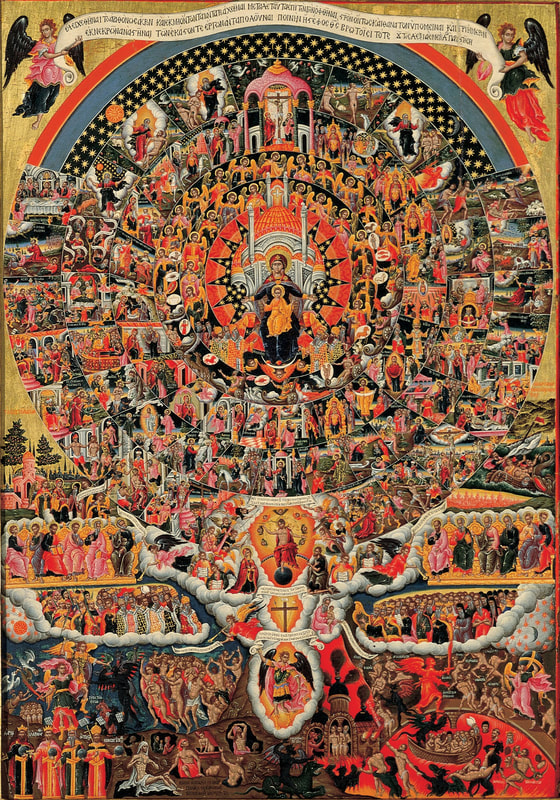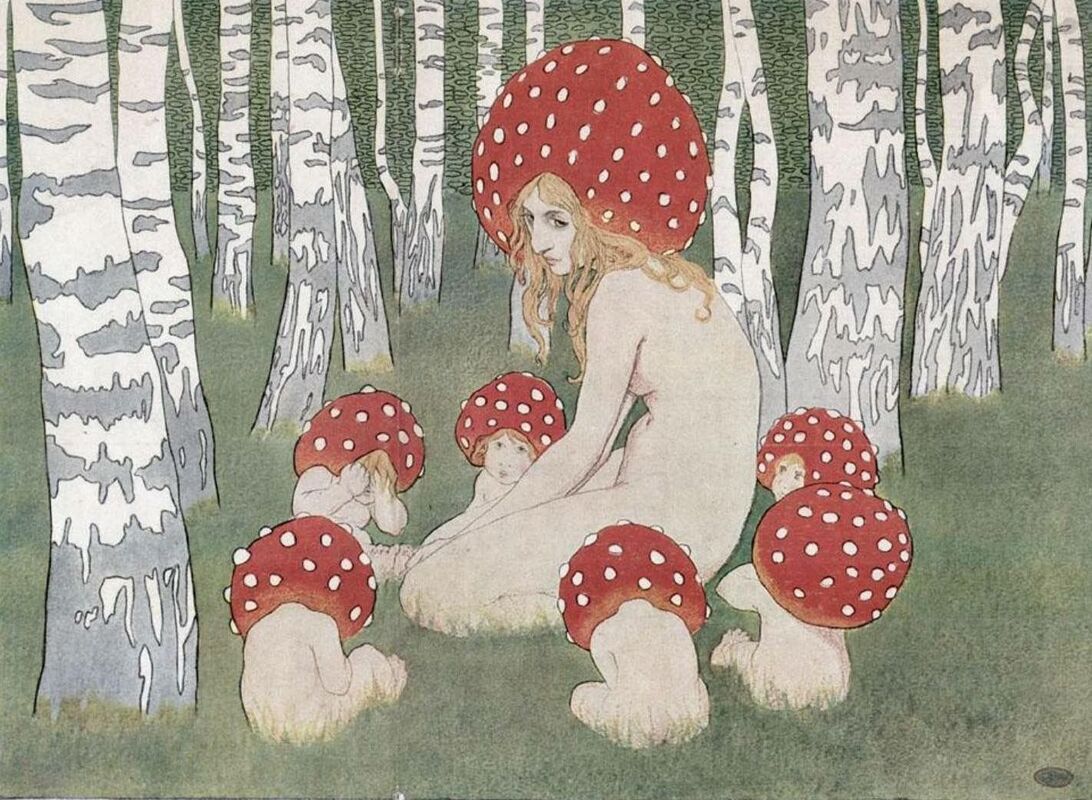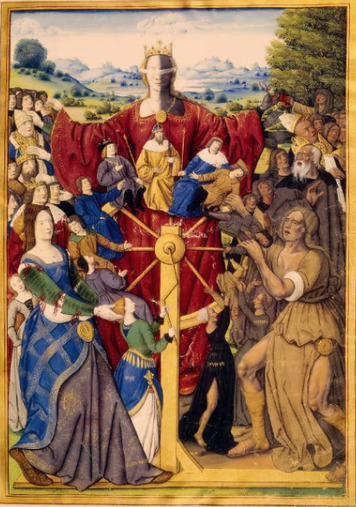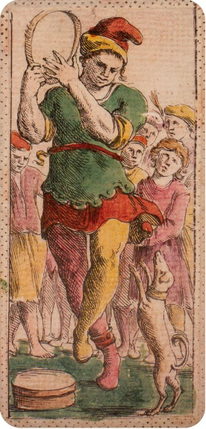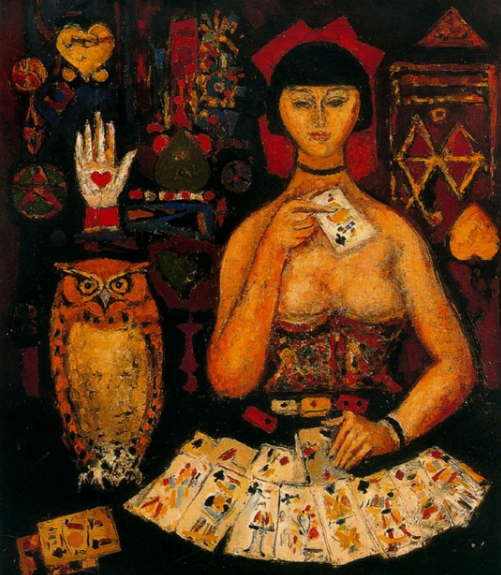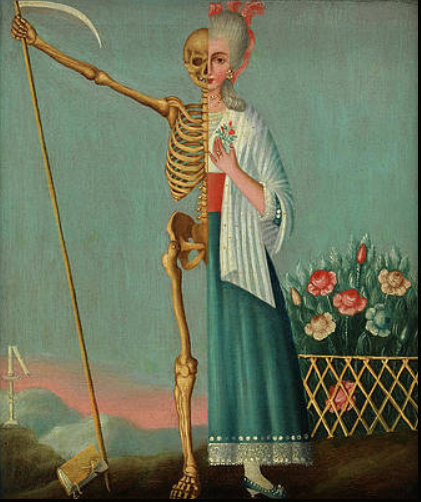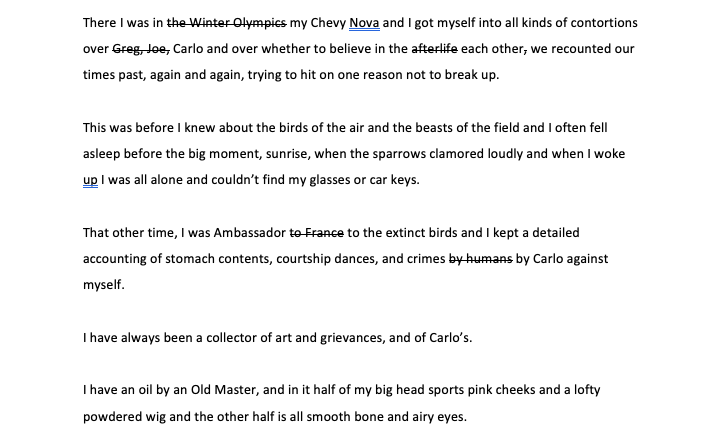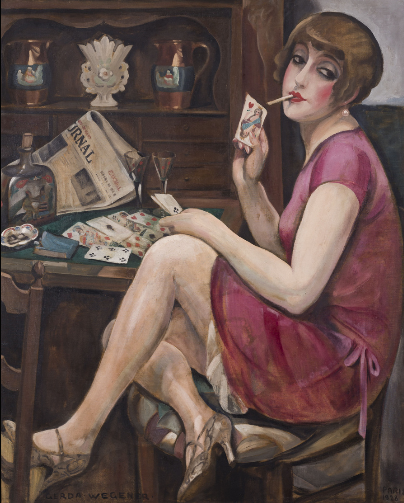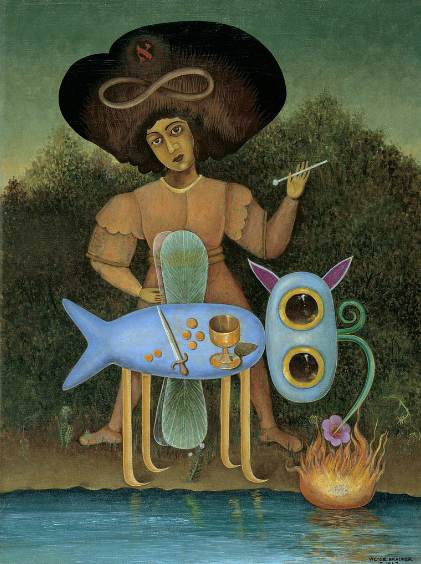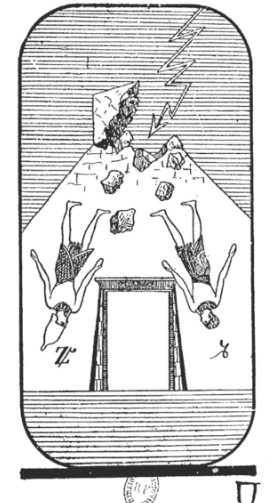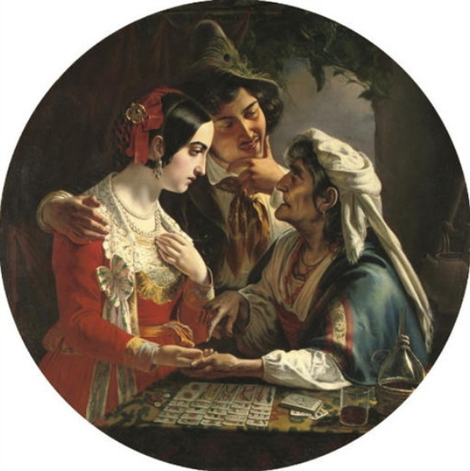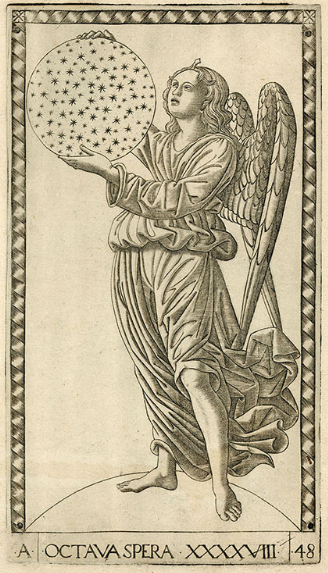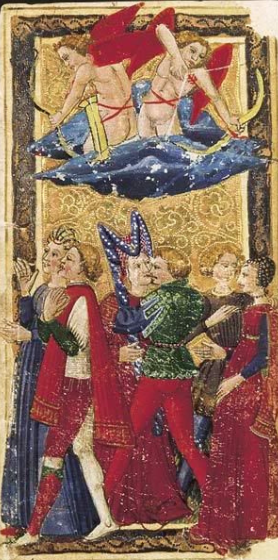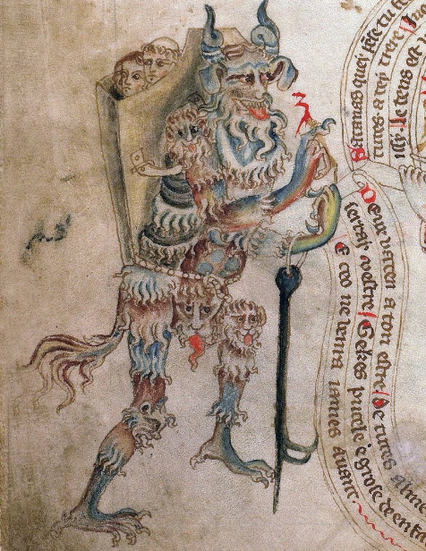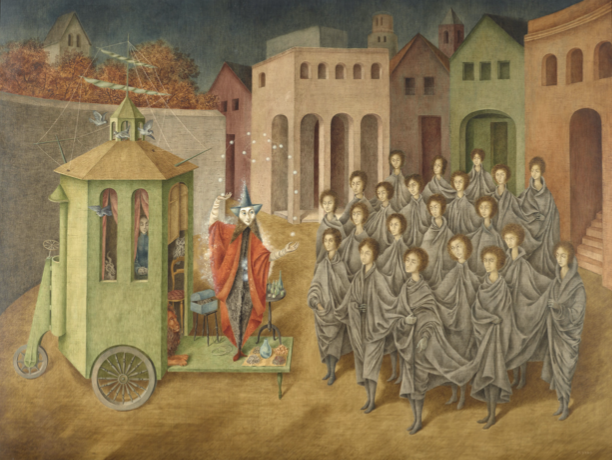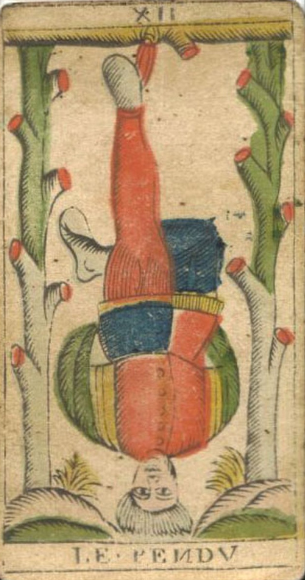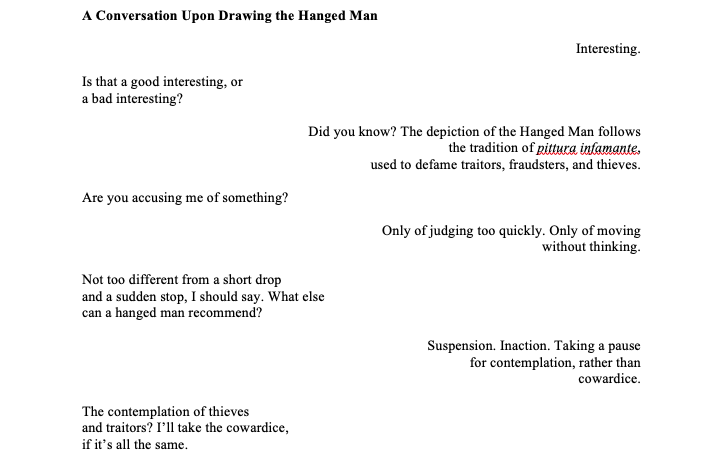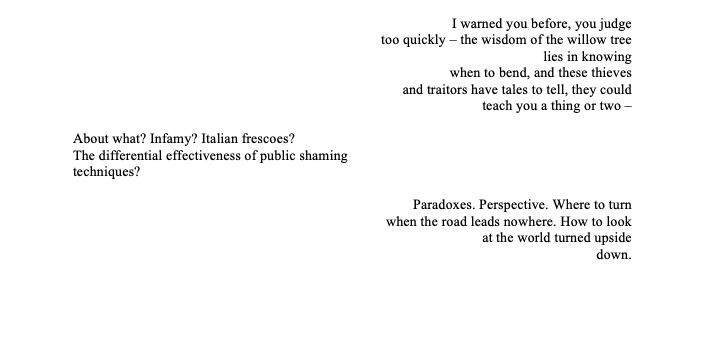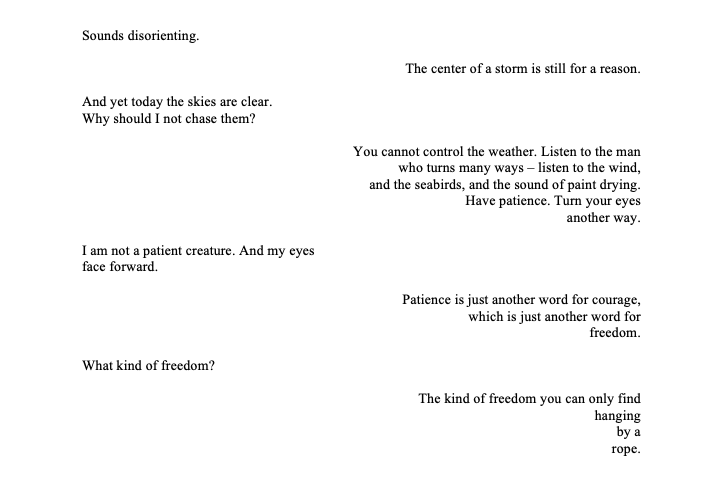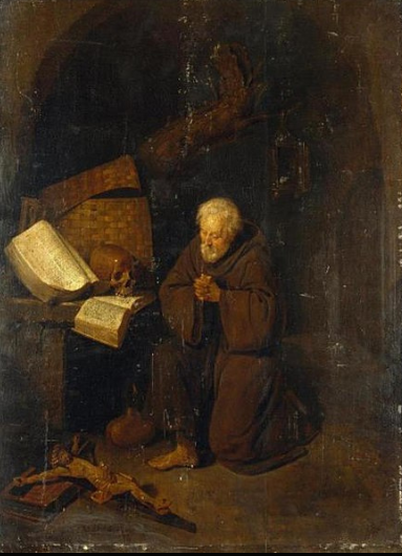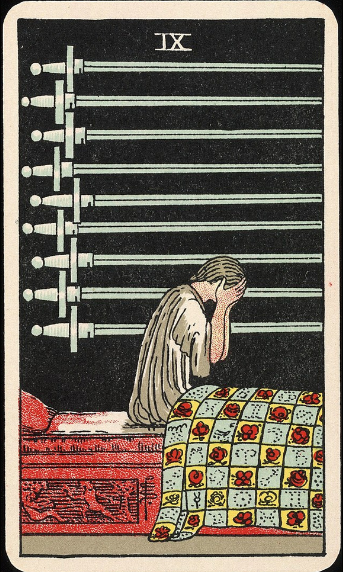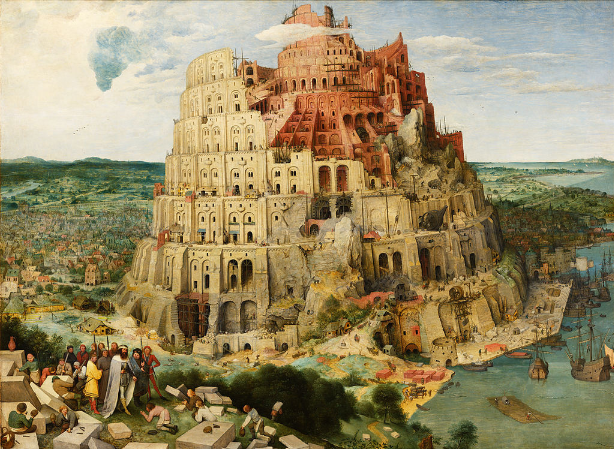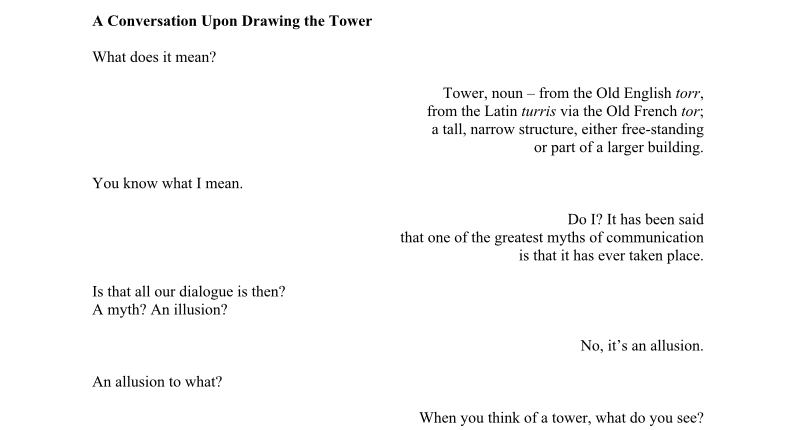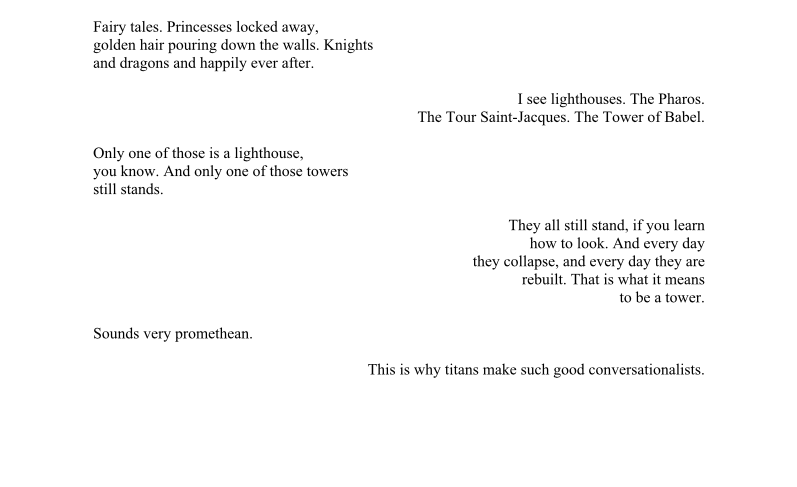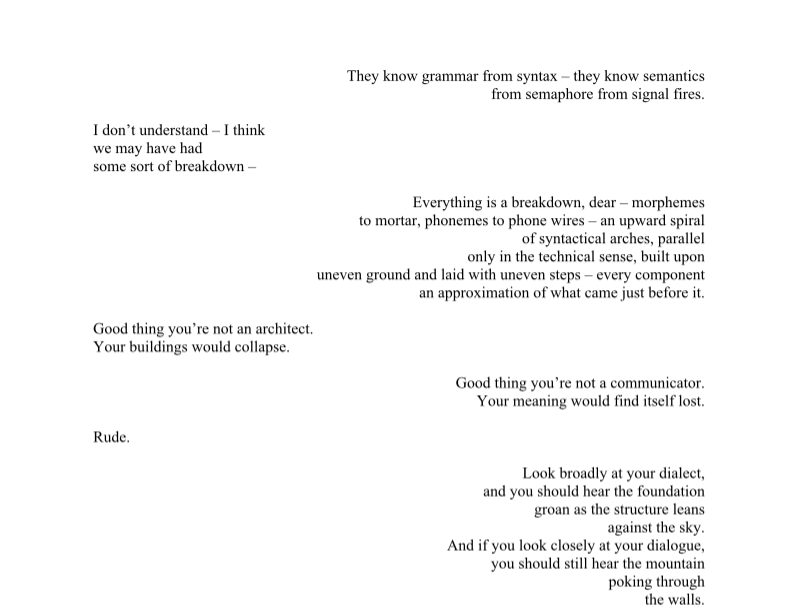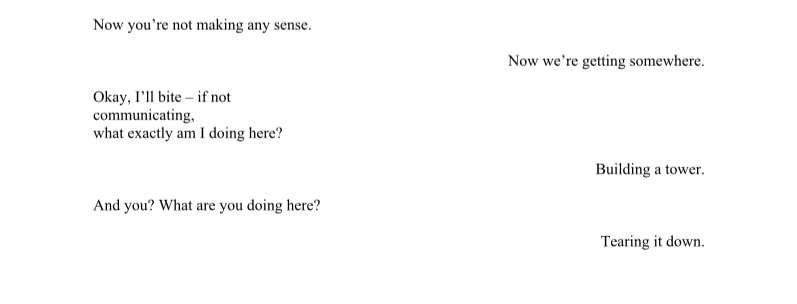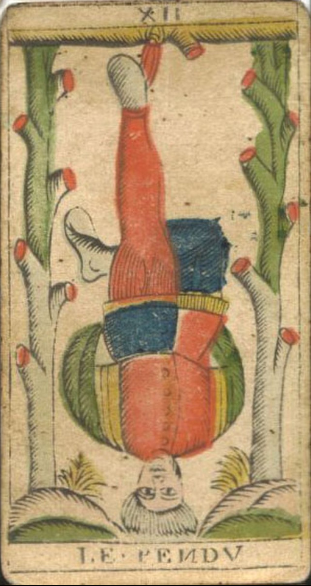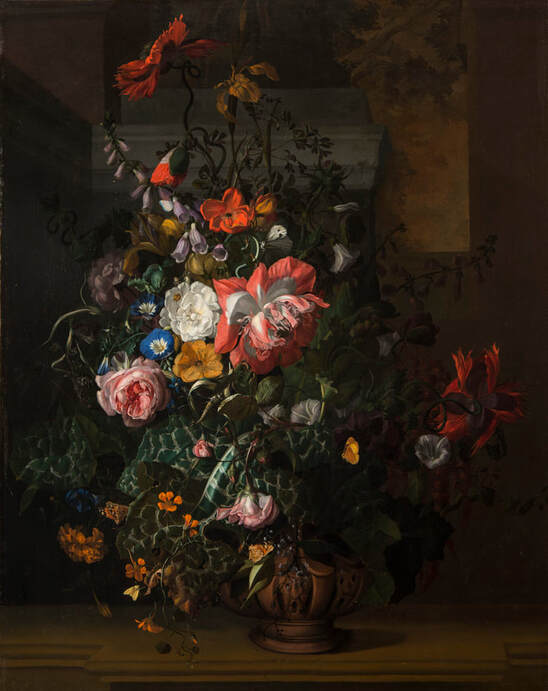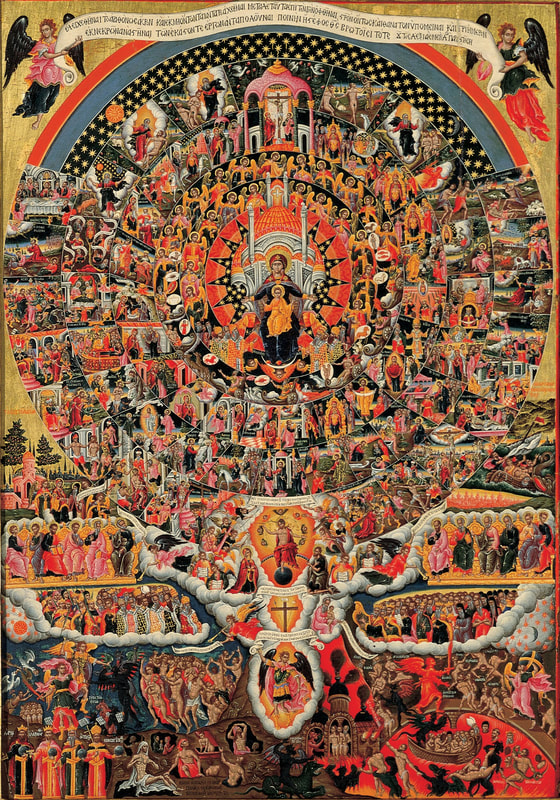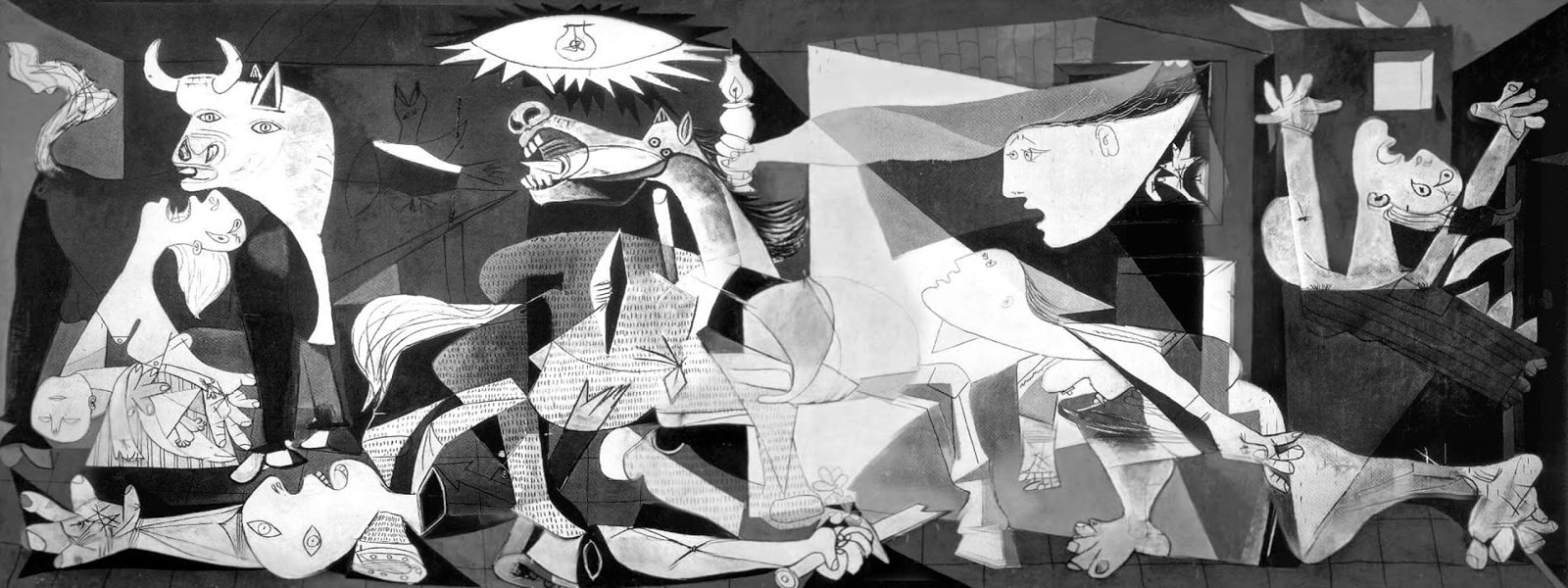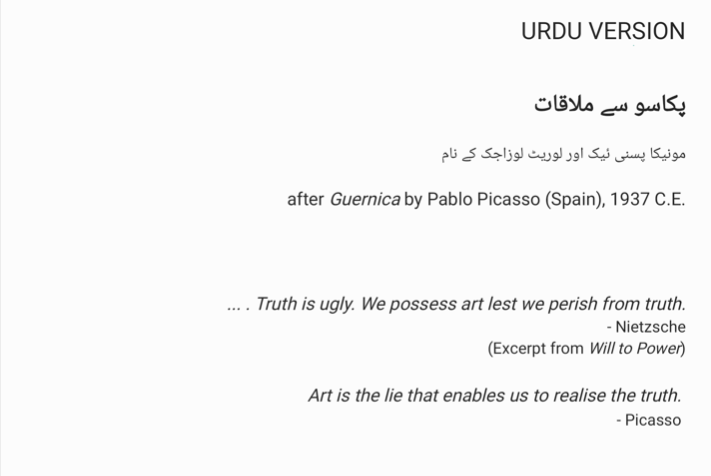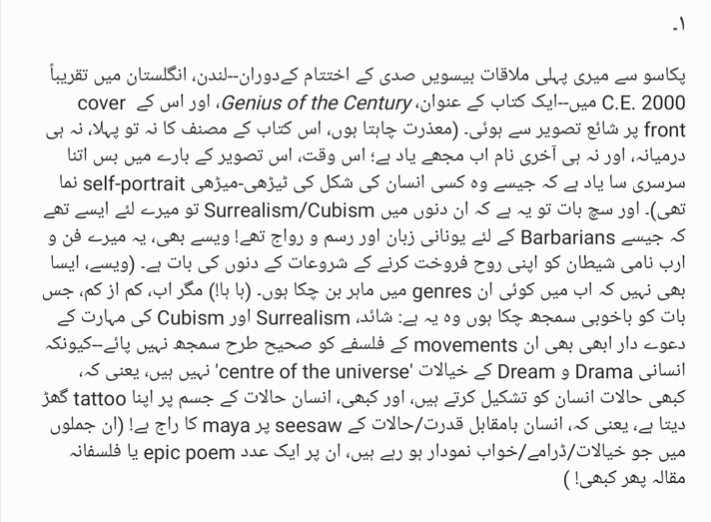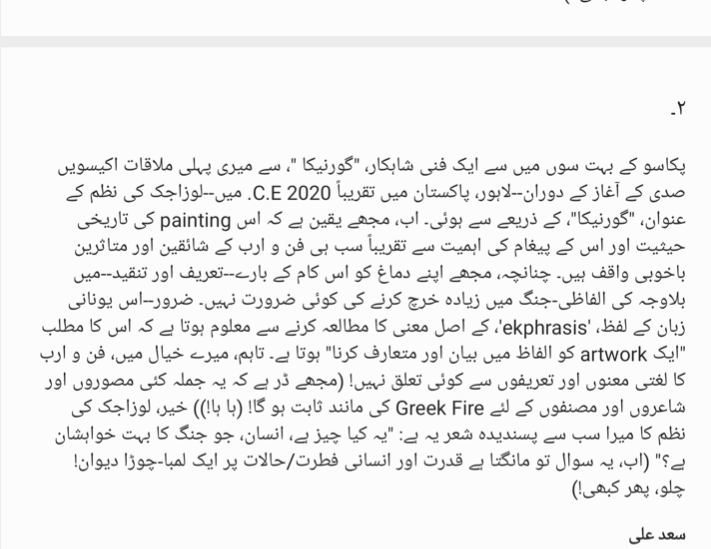|
Where’s Poulakis? I know you’ve left your mark, painted yourself into the scene. I’ll find you. No way you’re not among those people, women, priests, vicars, holy men all paying tribute to the virgin. I’ll find you. It might take all day, with magnifier, but honestly, I feel a smoldering fire burning, scorching the canvas, teasing. I’ll find you. There you are, ha! Discreetly hidden among all those in concentric circles, vast corners straining for a look. I found you. There you are. You exist in all men, Poulakis – wearing every garb, cloak, singing anthems in chorus. Where’s Poulakis? He’s there. Julie A. Dickson Julie A. Dickson holds a BPS in Behavioral Science, always studying people and environment, writing of memories, nature and from art and other prompts. She is hooked on ekphrastic! Her poetry appears in over 55 journals, including Masticadores USA, Last Leaves, Girl God and The Ekphrastic Review. Dickson shares her home with two rescued feral cats and advocates for captive elephants. ** All of Creation Rejoices In this dark, holy place, within me and outside, I hear my prayer echo: "All of Creation rejoices in thee..." and the listening heart hears the icon whisper -- "...from angels in heaven..." -- like arrows by night the plague will not touch you, since you know my name. Look up to the hills -- the silhouetted tops reveal the first and last light. The nearby pine trees grudged to shed the snow. They too resist change. "O sanctified Temple, spiritual paradise, glory of virgins..." That is our hint of the Garden. "And he made thy body into a throne..." we see set high on a wheel of the robed saints and many sinners. The organist monk tuned up the monks for long chants His mic moved like a wand as he soothed our souls before we chanted at Compline, like old night watchmen, standing here for our safety. The painted zodiac illumined for us streams of blood and tears as we groan in that dark -- "All of Creation rejoices in thee..." O clement, O loving, O sweetness. As candles are snuffed, we welcome morning, closing the night, while we watch as for the Last Day. Royal Rhodes Royal Rhodes taught courses in the history of Christianity for over 40 years. His poems have appeared in The Ekphrastic Review, Last Stanza, The Montreal Review, The Lyric, and over 45 other literary publications. His art and poetry collaboration, Specimens and Reflections: Photographic Panoramas of Italian Churches, was on exhibit recently at Fairfield University. This exhibition is going soon to the Mercy Center in Madison, Connecticut. ** Let it be to me as you have said Luke 1:38 O Eden’s saddest day in your unabashed freedom, why run away and hide? Why listen to that twisted voice? Naked, dead, emaciated, burning. Rescue plan enacted. Birth, life, death – familiar proceedings. Son says Yes, Virgin too, nothing stays the same. The Lord who conceived it all becomes as small as a droplet. In a million scenes of people, devils and angels, the only empty one is the cross. She has no idea but opens her arms anyway. Orange orbs, orange wings, orange fire, orange gowns, she even swaddles you in orange. I do not know what to look at, my brain overloads like a camel’s back heavy with gold and spice. I need a magnifying glass. Descend and guide me, overshadow me too, Great Dove. I know about false prophecies and invented predictions, but I know too that God’s word is central to what I know. As the wheel spins and I roll my dice, I lose sight of him, then am drawn back to focus. Poulakis paints in minute detail with limited palette, seeing only in part as we all do for now. Clouds carry angels far more than we note. Every star, every chapter of his story accounted for. Enthroned, paramount, surrounded by fanfare, an aura of stars, a chorale of angels. Evening and morning, past and present, all was very good – Jesus sits on Mary’s lap waiting for a drink. Helen Freeman Helen started writing poetry whilst recovering from an accident in Oman and got hooked. She loves following the Ekphrastic Review and trying her hand at some challenges. Instagram @chemchemi.hf ** In Silence Across the fields I can see the radiance of your smile and know in my heart you are there. But the anguish I am feeling makes the distance so very far to cross. Deidra Sarault Thrown back into time before Jesus was known in the line of Elizabeth. There was a time of belief - In the Teacher Whose loss has no, measurable distance. But in that Silence The words spoke, bytes and cords electronic music, eclectic retro, walking boom-boxes. Defying gravity In one sentence the mind, relates to the environment. Distressed visions come back: To Life - Black Boxes Appropriate responses revealing symmetry and transparency in a, blind sense, boldly. This space, this river, this world- feelings prickly and truthful, intense, knowing, tarnished and engrained. Cosmopolitan being speaks, as if - A citizen of the world. Robbed of the real Judas bit into the apple, and it tasted good. Her Silence MWPiercy MWPiercy is a writer and artist. ** In Which the Stars Happily Ignore Yer Vermilion Caps Hear our rubies, O ye gem-cut gods of red, of oxides, of radicchio; Patron saints of cinnabar, blood, and rust, of ripe tomatoes, chilies, of Mandril asses and cochineal, of Mars and cranberries: we without humility beseech thee. Take thou the chlorophyll from our veins so we are autumnal and airborne, brittled so that we might more easily teeter ranting upon the hallelujahs of angels: Angels arranged in hosts so vast our eyes cannot see nor our jockeying impede The self-aggrandizements of our faith that are most worthlessly worthy, most mindlessly denying, most giddy to destroy thy naysayers as they wail unaware of their own foolishness. We — the fawning maroons, the disrespectful, the unwoke; the canceled, the abyss that gazes back blankly — we crave the pain of thy ruddy glory and, verily, relish the prick of thorned crowns atop our crucifixes of unannounced active shooter drills. Make us disciples according to thine image, our undeserving devotion crimsoning skyward to thee, geysers resplendent in the rose shadow of dusk as children make scarlet wishes at our feet and toss each other lit cherry bombs in worship. R. Hamilton R Hamilton (they/them) is returning to poetry after retiring from a career backstage in the performing arts, which happened to coincide with the pandemic. Their work has been published by Caesura, Oprelle, and Boats Against The Current, among others. ** A Villanelle Honouring the Painting: Hymn to the Virgin —including the line, “All of Creation rejoices in thee,” from the hymn composed by the Syrian monk John of Damascus All of Creation rejoices in thee, honours your being, ennobles your face, the painter, the Virgin, the devotee. In painterly ring, the angels agree, where Mary and Jesus anchor the space, all of Creation rejoices in thee. Tempera swirls midst a circular sea of Christian depictions, a holy place for the painter, the Virgin, the devotee. Bible themes sweep like an orbital creed, as iconic scenes shape image, launch pace. All of Creation rejoices in thee. Veiled meanings exist in varied degrees, as if an enigma, a religious maze, for the painter, the Virgin, the devotee. Like music within a spherical spree, it hums as if hymn, a hymnal of grace. All of Creation rejoices in thee, the painter, the Virgin, the devotee. Jeannie E. Roberts Jeannie E. Roberts has authored eight books, six poetry collections and two illustrated children's books. Her most recent collection is titled The Ethereal Effect - A Collection of Villanelles (Kelsay Books, 2022). She is a member of the Wisconsin Fellowship of Poets, listed in the Poets & Writers directory, serves as a poetry editor for the online literary magazine Halfway Down the Stairs, and is a Best of the Net and an Eric Hoffer award nominee. ** In Thee Rejoiceth Garnets, Rubies, Amethysts, Carnelians In the blue, glass fruit bowl. My mother's eyes reflected back in the glass My lover's heart arranged like a crown. The fruits of love ripening On the tree of life. I will eat them when the time is right, but for now lose myself amongst the branches. Christopher Martin Christopher Martin is a poet and Buddhist living on the North East coast of England. His work has featured in various publications. His debut collection is due out in 2024 with the @theblackcatpoetrypress ** Between Silences 1 When I was young I painted a woman. I called her Our Lady of Manhattan-- just an ordinary dark-haired mortal, her hand raised in blessing. What was she blessing? 2 Motherhood is the basic means by which life continues. Birth is messy. Life is messy. What child is this? Blood, the darkness before light. Hold the light. Hold the shadow too. 3 The sun dies and is reborn inside its own ashes-- I stand on the edge inside the mirror that reflects both ways. The narrative enters, fills me with all that I will never comprehend-- bones brimmed into silence, mind beset by stars. 4 The shelter of trees, the shield of a raptor’s wing-- the cover of the night sky, the protection of the moon-- it won’t be long before all we have lost will be forgotten, visiting us only in strange incoherent dreams. 5 They were merely stories superimposed on infinity-- currents traveling through veins beneath transparent skin. How can you reproduce the alchemy of angels?-- In the beginning, the blood of roses—ever after, the crown of thorns. Kerfe Roig A resident of New York City, Kerfe Roig enjoys transforming words and images into something new. Follow her explorations on her blogs,https://methodtwomadness.wordpress.com/ (which she does with her friend Nina), and https://kblog.blog/. ** Icon To discover an icon painting course in a mountain town in Wales was unexpected, but as a lover of the unexpected I enrolled. Tad, the Orthodox priest looked authentic with his black robes and long beard. That was unexpected too. There was no gold there only slate which was not suitable so we made do with paint and shiny foil. Tad was pleased with the results and congratulated us all. We gave them to his church as expected. Lynn White Lynn White lives in north Wales. Her work is influenced by issues of social justice and events, places and people she has known or imagined. She is especially interested in exploring the boundaries of dream, fantasy and reality. She was shortlisted in the Theatre Cloud 'War Poetry for Today' competition and has been nominated for a Pushcart Prize, Best of the Net and a Rhysling Award. Her poetry has appeared in many publications including: Consequence Magazine, Firewords, Vagabond Press, Gyroscope Review and So It Goes Journal. Find Lynn at: https://lynnwhitepoetry.blogspot.com and https://www.facebook.com///www.facebook.com/Lynn-White-Poetry-1603675983213077/ ** Of A Vision And this angel told me to peer into a hole a little gap between the things I believed. So I looked and I saw a mandala made of people running inside a wheel. I knew that soon I would have to turn away and it would be like pulling my finger from the dam, all the people would come pouring into the world and my life would never be the same again. Marc Brimble Marc lives in Spain and likes drinking tea. You can read some of his work here: marcbrimble.substack ** You Never Asked To Be The One. You are a Virgin almost swallowed by a mob of sinners, saints and demons; they keep you trapped while the child sits on your lap, innocent and unaware. A golden penny for your thoughts. Do you wish them gone? Do you wish their clamouring would cease? The artist sentenced you to eternal captivity within a melee of human conflagration, your arms out-stretched: a plea to each and every soul to leave you well alone, to set you free from the obligation God dropped like a load of stone to crush your latent dreams. Do you plot your path to freedom through this maze of writhing bodies? Is there one amongst this restless throng who will put their own intent aside and guide you safely along the blackened roads to freedom? Or are you doomed to sit forever within your gilded frame until you die and the child becomes as you, a sacrificial lamb on the throne of creation? Linda McQuarrie-Bowerman Linda lives in Lake Tabourie, NSW, Australia, by the sea. In this beautiful environment, she writes poetry and has recently dabbled in flash fiction. Linda is completing her degree in Creative Writing at Curtin University and enjoys seeing her work published in various literary spaces. She is a recent Pushcart Nominee thanks to The Ekphrastic Review. ** Saviour The virgin Mary sits on her throne with baby Jesus, in an embellishment of orange and gold colours the heavens have made. Angels soar above praising mother and child, holding a banner welcoming the newborn. Strangers have come from far away villages to see the newborn deliverer, their protector. They raise hands in prayer seeking guidance. Mary, head high, blesses them with words of encouragement and lifts the baby for all to see. The crowd cheers with excitement and full of hope. The King, the saviour of His people. The sacrifice. Lisa M. Scuderi-Burkimsher Lisa M. Scuderi-Burkimsher has been writing since 2010 and has had many micro-flash fiction stories published. In 2018 her book Shorts for the Short Story Enthusiasts, was published and The Importance of Being Short, in 2019. Her most recent book In A Flash, was published in the spring of 2022. She currently resides on Long Island, New York with her husband Richard and dogs Lucy and Breanna. ** The Divinity of Life in All Things The world's as precious as a honeybee and treasured as the clear sparkling dew it's exquisite as a bride in her sari the world's clearly, as dear to me as you. The divinity of life in all things is always fresh and unsoiled virginal has the purity of gold, crowning kings the majesty of a queen worshipful the world a pear balanced about to fall a star trembling upon a midnight hour we each part of the final segments whole synchronicity blooms but one flower delicate as woven silk unravels like dead flowers to seed on their scaffolds. Mark Andrew Heathcote Mark Andrew Heathcote is adult learning difficulties support worker. He has poems published in journals, magazines, and anthologies both online and in print. He resides in the UK, and is from Manchester. Mark is the author of In Perpetuity and Back on Earth, two books of poems published by Creative Talents Unleashed. ** Centered—a bit of prose musing on motherhood Mary is at the center of it all. Poulakis has placed her there. History has placed her there. The Bible and even Science agree—a mother’s role is at the centre of it all. For Mary, this centering as Mother of God when He came to Earth Himself carries with it the right to veneration. Flanked by angels who honor her and Gabriel’s declaration to her, she is honoured for having been chosen and known by God to be the person designated for this role from the beginning of time and whose impact will continue until and beyond time’s earthly end. From the time of Eve’s failing and our dismissal from Eden (now guarded with a flaming sword)until the Last Judgement when we are separated into lambs of God and goats of Satan, she reigns with the Child, still a babe when his Godhead showed, in her heart the knowledge of the pain if not the actuality of the Cross—she is at the centre of it all. With humility she accepted this role, this motherhood, to magnify her Lord her God, as a vessel and a guide for his human side. As I ponder my own role as a mother, and my mother’s role in my life, I realize all mothers are at the Center of this nexus of life, our cells plotting partially a path for our progeny, a privilege and a burden, each step simultaneously filled with joy and tinged with sorrow. I look back upon my own mother and see her role radiating out into my life. I look ahead to my daughter and see that indeed, willingly and not, my life has played a central role in her impact on the world—not for me to take credit, but for me as a channel. No angel came to tell me of her birth, but science explains that women pass on the cells of the maternal line, even back to grandmothers to their offspring. So it is no wonder that days after I discovered I was pregnant, I dreamt my mother came and that my daughter would love her—yes, a daughter—and this in the time before gender reveal parties. My reveal came in a dream. So, yes, this painting with all of its facets—it would take me months, years, perhaps a lifetime, to explore each and every one of them is in some ways my mother holding me, me holding my daughter. The details of destiny that radiate will be different , I do not claim a role of salvation nor to have been inserted in the line of such a lofty task, even with my wonderful child, but oh yes, the centering. That is real. Like Mary, I accepted with humility my place in this progression of cells, of love, a calling filled with joy. And remember like all mothers, she magnifies the Lord with the joy and reverence of a calling all mothers share-- to love and cherish our babes and pray them to adulthood, to develop their own free and independent (of us) lives of service and wonder. Mary leads the way to understanding that mothers are the centre of it all. Joan Leotta Joan Leotta plays with words on page and stage. She performs tales featuring food, family, and strong women. Widely published, including on Poetry Super Highway and Haiku Universe. A member of the NC Poetry Society, Sisters in Crime, Short Mystery Fiction Society, and Tar Heel Tellers, she writes in several genres. Leotta is a 2021 and a 2022 Pushcart nominee and was a 2022 runner-up in the Robert Frost Competition. Her new chapbook, Feathers on Stone, is out from Main Street Rag.
0 Comments
Join us for biweekly ekphrastic writing challenges. See why so many writers are hooked on ekphrasis! We feature some of the most accomplished, influential writers working today, and we also welcome emerging or first time writers and those who simply want to experience art in a deeper way or try something creative. The prompt this time is Mother Mushroom and Her Children, by Edward Okun. Deadline is January 6, 2023. You can submit poetry, creative nonfiction, flash fiction, microfiction, or any other form creative writing you like. 1000 words max please. The Rules 1. Use this visual art prompt as a springboard for your writing. It can be a poem or short prose (fiction or nonfiction.) You can research the artwork or artist and use your discoveries to fuel your writing, or you can let the image alone provoke your imagination. 2. Write as many poems and stories as you like. Send only your best works or final draft, not everything you wrote down. (Please note, experimental formats are difficult to publish online. We will consider them but they present technical difficulties with web software that may not be easily resolved.) Please copy and paste your submission into the body of the email, even if you include an attachment such as Word or PDF. 3. There is no mandatory submission fee, but we ask you to consider a voluntary donation to show your support to the time, management, maintenance, and promotion of The Ekphrastic Review. It takes an incredible amount of time to curate the journal, read regular and contest submissions, etc. Paying all expenses out of pocket is also prohibitive. Thank you. A voluntary gift does not affect the selection process in any way. 4. USE THIS EMAIL ONLY. Send your work to [email protected]. Challenge submissions sent to the other inboxes will most likely be lost as those are read in chronological order of receipt, weeks or longer behind, and are not seen at all by guest editors. They will be discarded. Sorry. 5.Include OKUN CHALLENGE in the subject line. 6. Include your name and a brief bio. If you do not include your bio, it will not be included with your work, if accepted. Even if you have already written for The Ekphrastic Review or submitted other works and your bio is "on file" you must include it in your challenge submission. Do not send it after acceptance or later; it will not be added to your piece. Guest editors may not be familiar with your bio or have access to archives. We are sorry about these technicalities, but have found that following up, requesting, adding, and changing later takes too much time and is very confusing. 7. Late submissions will be discarded. Sorry. 8. Deadline is midnight EST, January 6, 2023. 9. Please do not send revisions, corrections, or changes to your poetry or your biography after the fact. If it's not ready yet, hang on to it until it is. 10. Selected submissions will be published together, with the prompt, one week after the deadline. 11. Due to the demands of the increasing volume of submissions, we do not send out sorry notices or yes letters. You will see what poetry and stories have been selected when the responses are posted one week after the deadline. Understand that we value your participation as part of our ekphrastic community, but we can only choose a handful of the many entries we receive. 12. A word on the selection process: we strive for a balance between rewarding regular participants and sharing the voices of writers who are new to our family. We also look for a variety of perspectives and styles, and a range of interesting takes on the painting. It is difficult to reproduce experimental formatting, so unfortunately we won't choose many with unusual spacing or typography. 13. By submitting to The Ekphrastic Review, you are also automatically joining our subscribers' list. Your submission is your permission. We don't send Spam and we don't send many emails- you will not receive forty-four emails a day! Our newsletter occasionally updates you on some of the challenges, news, contests, prize nominations, ekphrastic happenings, prompt ebooks, workshops, and more. 14. Rinse and repeat with upcoming ekphrastic writing challenges! 15. Please share this prompt with your writing groups, Facebook groups, social media circles, and anywhere else you can. The simple act of sharing brings readers to The Ekphrastic Review, and that is the best way to support the poets and writers on our pages! 16. Check this space every Friday for new challenges and selected responses, alternating weekly. A big congratulations to our finalists, winners, and everyone who entered the Art of Tarot contest in poetry or flash fiction. It has been amazing to see how the themes and symbols in the game of Tarot have evolved and continue to speak today. A giant thank you to our judges, Riham Adly, for flash fiction, and Roula-Maria Dib, for poetry. Both judges read the submissions blindly and chose their top ten, top three, and the winning work. First place winner in poetry and in flash fiction will receive a $100 prize. Well done everyone! Lorette, The Ekphrastic Review (Click here for poetry finalists and winners!) Top Three in Flash Fiction Shadow Children, by Lisa Molina (flash fiction winner) Circus, by Bayveen O'Connell The Heartland: A Three-Card Spread, by Nancy Stohlman Ten Finalists This Week’s Tarot Card: Death (Reversed)*, by Valerie Fox Playing Solitaire, by Hedy Habra What Do You Think I Do When I Pretend I'm Fishing, by Hedy Habra That Last Year, by Mary McCarthy Shadow Children, by Lisa Molina Circus, by Bayveen O'Connell Tempted, by Bayveen O'Connell Amira, My Princess, by MWPiercy The Heartland: a Three Card Spread, by Nancy Stohlman Endgame, by Mary Thompson Winning Story: Shadow Children As an adult, I recently learned that I was once a Shadow Child next to Lady Fortune’s Wheel. It’s no one’s fault. Lady Fortune is blind-folded. I’m sure she assumes it is our brothers and sisters with life-threatening illnesses who fall off the wheel and sit in the dark after the wheel goes down, down, down. And yes, as time goes on and the wheel goes round, through rounds and rounds of chemo, they are in the depths of the shadows a lot of the time. But with the help of our parents, grandparents, friends, and extended family, they are able to hang on, stay on, until the wheel rises again. It is our job, as the healthy siblings of our sick siblings, to keep off of that wheel. So we remain in the shadows, watching and waiting, not wanting anyone to worry about us. As for me, I go to school. I do my chores without being told. I never complain. I certainly never cry. And then one day, my dad takes me, just me, to a carnival. It is a bright sunny day, and the rides are all on a pier that juts out into the ocean. Since the pier is narrow and straight, most of the rides just go around and around in small circles. I am instantly drawn to the Ferris wheel at the very end of the pier. It is called “Lady Fortune’s Wheel.” I look up to see the top of it, and the sun rays reach out to me as arms through the spokes. We get into our seats and feel a small jerk as the wheel starts to turn and we begin to rise. I see the whole island shrink smaller and smaller the higher we go, and the ocean gets larger and larger, sun dapples glinting off its surface. I smell the sea air and feel the ocean breeze flowing through my hair. After going around a few times, the ride suddenly stops when we are at the very top. I look all around me, sun still shining on my face and realize that, at this very moment, I’m no longer ‘pretending’ to be happy. And then, without warning, a guttural moan begins to howl deep down within my gut. It is growing, coming up, up, up, just like the Ferris wheel. I can’t stop it, no matter how hard I try to keep it inside. My mouth opens wide, and I wail uncontrollably into the sea air. Wails of pain. Wails of guilt. Wails of fear. My father quickly puts his arms around me, and holds me tight, telling me, over and over, “It’s ok, let it out, let it all out, it’s ok... You don’t have to be so quiet and strong all the time.” He puts his face down onto the top of my head and I hear that he, too, is now crying. The seagulls cry with us, as my dad and I sit suspended on top of the world. Soon, we feel a jerk and the wheel begins its journey back down to the wooden pier. The following spring, all four of us are at the carnival on the pier. My brother has been given a break from his treatments, and his hair is growing back, lighter and curlier than before. “Let’s go on the Ferris wheel,” I say as we show our wristbands to the lady at the entrance. “Nah,” my brother replies, “I don’t like things that go round and round and up and down. They make me dizzy and nauseous. I’d rather go and throw baseballs at bottles for prizes.” And he flexes his atrophied biceps in triumph. Instinctively, I begin to go along with what he would like to do; but something inside me clicks, like when the Ferris wheel stopped unexpectedly while my dad and I were at the top. I smile at him and say, “You go ahead. I’m going to ride the Ferris wheel. It’s such a beautiful day, and I love the view from the top. After the ride, I’ll meet you over there. See ya’” I wave at him, and walk over to Lady Fortune’s Wheel. I want to feel the sun on my face, see from the top of the world, and maybe even cry a little with the seagulls. Lisa Molina Lisa Molina is a 2022 “Best of the Net” nominee for poetry. Her digital chapbook Don’t Fall in Love with Sisyphus launched in February 2022, by Fahmidan Publishing, and her first print chapbook, Womb Worlds is currently available for pre-sale at Finishing Line Press. Molina’s poetry, creative nonfiction, and fiction can be found or is forthcoming in The Ekphrastic Review, Sky Island Journal, Beyond Words Magazine, Bright Flash Literary Review, POETiCA REViEW, and Miniskirt Magazine. Top Three Flash Fiction Finalist Circus My house is a circus. Our dog, Trixie, wears a tiny top hat and red jacket. I’ve taught her how to bark: Roll up! Roll up! In the basement, you’ll find my zitty sister putting on clown makeup to hide her face. In the spare room you’ll see the ‘Incredible Sleeping Man’ modelled on Rip Van Winkle in his deepest REM cycle: that’s grandpa. He could just be dead though – best to check with a mirror. Upstairs my brother Joe is a stomping elephant trying to break its shackles, he calls it moshing. In the living room baby Ruby tumbles off the couch, carousels over the coffee table. She’s our little acrobat. In the kitchen Dad is a lion roaring because his dinner isn’t ready, and Mom tippy-toes around him, tightrope walking between the fridge and the cooker. And me? Well I’m just the ‘Invisible Girl.’ Bayveen O'Connell Bayveen O'Connell is a teacher and writing facilitator based in Ireland. Her words have appeared in Splonk, the Ekphrastic Review, Janus Lit, Fractured Lit, The Forge, Scrawl Place, Grimsy, Ellipsis Zine, and others. Her flash fiction has received nominations for 2023 Best Microfiction, and the Pushcart prize. She's inspired by art, history, travel, myth and folklore. Top Three Flash Fiction Finalist The Heartland: A Three-Card Spread The Dollar General One of the major arcana cards, the run-down Dollar General is the quintessential symbol of The Heartland. The Dollar General is the gathering place, the hearth, the sun around which the neighbors can congregate and bargain hunt together, in community. Notice the halo of light around the yellow Dollar General lettering, the field of monocrops, how the borders of the card are decorated with cows in feedlots. The baby cows in the corners are mirrors of one another, a symbolic reminder that this scene will go on and on, into eternity. If you have drawn the Dollar General card it means you are the kind of person who can disappear out here, who can live an entire life without making a mark anywhere. You are the sort of person who will die quietly. There will be little said at your funeral. You are just one of many cogs, many thrusts of blood pulsing through the heart of The Heartland, and like the cows, your life is not meant to be individual or unique. If this card is reversed, you may be trying to leave but Dollar General continues to tempt you back with its low low prices. The King of Big Gulps The King of Big Gulps, seen here in his living room, has been your best friend for over 30 years. In this card he’s in a lot of pain. Notice the pack of cigarettes on the table, a symbol of defeat, the brimming Big Gulp at his feet. He is dressed in the traditional garb of the town but his jeans are torn, t-shirt stretched, hair going white, a nod to his maturity and wisdom. Though the King is clearly suffering, clearly at war with his own body, he is surrounded by the same halo of light seen in the Dollar General card. If you draw the King of Big Gulps, he may have called you six weeks ago to say he was dying. To ask you, as his oldest friend, to throw him a goodbye party. You might have wept together on the phone, separated by miles and decades. You will always remember the King as he was, controlling the lightning and the winds. Receiving the King of Big Gulps is a message about the enigma of healing—how we heal and how we don’t. Notice the ankle and wrist cuffs, the key around his neck. The King asks us to question our illusions: How do we keep ourselves in our own chains? How can we see the key around our own necks? If you draw this card you may find yourself driving 10 hours across Kansas and Missouri, a place you haven’t seen in 12 years, to find out before it’s too late. The Three of Corn Three ears of strong corn grow from a stalk in the centre of a field of equally strong stalks. In the foreground you can see the abandoned town, the forgotten dreams. But the field of corn remains. Long after we’re all gone, the corn remains. Nancy Stohlman Nancy Stohlman is the author of six books including After the Rapture, (March 2023), Madam Velvet’s Cabaret of Oddities, The Vixen Scream and Other Bible Stories, and Going Short: An Invitation to Flash Fiction, winner of the 2021 Reader Views Gold Award. Her work has been included in the Norton anthology New Micro: Exceptionally Short Fiction and The Best Small Fictions 2019, as well as adapted for both stage and screen. Other finalists, in alphabetical order: This Week’s Tarot Card: Death (Reversed)* 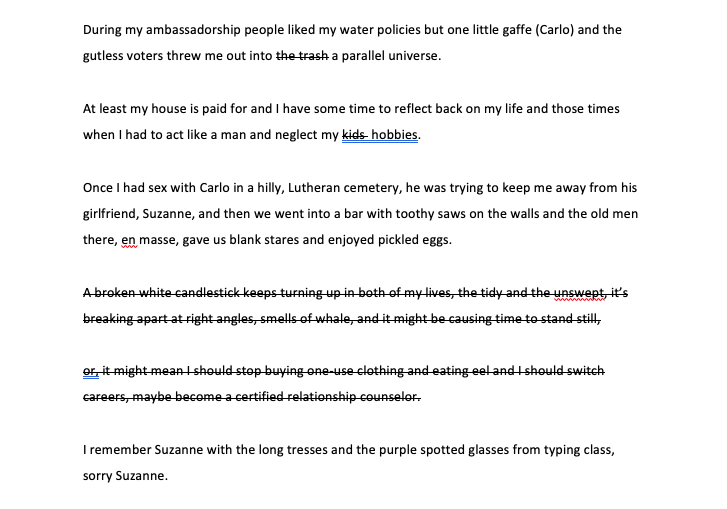 Valerie Fox Valerie Fox has published in numerous journals, including Juked, Ellipsis Zine, The Phare, Flash, Reflex, and The Café Irreal. Stories she has written have been included in the Best Small Fictions and Best Microfiction annuals. She published, The Real Sky, a hand-made collaborative artist’s book with visual artist Jacklynn Niemiec, in an edition of 26. Books include Insomniatic, The Rorschach Factory, and Bundles of Letters Including A, V and Epsilon (compilation with Arlene Ang). Playing Solitaire See, this is who I want to be: the Queen of Heart. Impassible, yet wearing a heart-shaped ruby pin swelling with anticipation as night after night I shuffle the deck and wait for his phone call. On the mahogany, a bottle of Wild Raspberry Eau-de-vie stands next to two glass flutes. Who would have thought I'd follow my grandmother's footsteps and align card after card in concentration? When it was my mother's turn to play Solitaire, she'd enter a meditative state while she allotted a special wish for each round. See, I love the way cards cover the table in rows, setting up an arcane tableau. Cigarette butts fill the ashtray as I'm back to chain smoking the way I did after my first heartbreak. Each spent cigarette giving hope and light to the next. Maybe a way to change the outcome, or myself? I move cards face-up one by one and mumble muffled sounds the way my grandmother and mother used to do. What did they wish for time after time? Hedy Habra Hedy Habra is a poet, artist and essayist. She is the author of three poetry collections from Press 53, most recently, The Taste of the Earth (2019), Winner of the Silver Nautilus Book Award and Honorable Mention for the Eric Hoffer Book Award; Tea in Heliopolis Winner of the Best Book Award and Under Brushstrokes, a Finalist for the International Book Award. A twenty one-time nominee for the Pushcart Prize and Best of the net, her multilingual work appears in numerous journals and anthologies. https://www.hedyhabra.com/ What Do You Think I Do When I Pretend I'm Fishing You may not know it, by under my brush, a new chain of communication is always created as I add layer after layer of colour and linseed oil. You might picture me in my atelier surrounded by all sorts of odd and prized objects and think I revel in the smell of ethereal solvents. But truly, I feel most at ease outdoors. My intimacies with nature run deep, in the murmur of leaves and roots, in riverbeds, ponds and waterfalls. At times, I watch ripples form over the surface of the water and pretend I'm fishing. Yes, I'm fishing for inspiration. But what I hold in my hands is not a fishing pole, it is a brush because my canvas is always nearby. I marvel at the dragonflies' flight as they hover in pairs over the water and kiss its surface to capture their prey. With a twist of my brush, the dragonfly grows in size and kisses a fish that has leapt out the water attracting a calico stray cat but remember, my brush is my wand and the fish whispers an arcane message to the cat whose whiskers tremble and reach onto the heart of a flower rising out of a fiery lotus-shaped lantern. And these connections keep echoing themselves ad libitum forever captured on the square space that has become a mandala. You have now guessed that my wildest dreams guide my brush at the rhythm of my renewed desires. Hedy Habra Hedy Habra is a poet, artist and essayist. She is the author of three poetry collections from Press 53, most recently, The Taste of the Earth (2019), Winner of the Silver Nautilus Book Award and Honorable Mention for the Eric Hoffer Book Award; Tea in Heliopolis Winner of the Best Book Award and Under Brushstrokes, a Finalist for the International Book Award. A twenty one-time nominee for the Pushcart Prize and Best of the net, her multilingual work appears in numerous journals and anthologies. https://www.hedyhabra.com/ That Last Year We were falling from the broken tower, the one we worked so hard to climb, old dreams and old promises coming down all around us like rocks in an avalanche, assumptions breaking up like ice in a too warm sea, leaving us with no foundation, no rest, no safe place to start again. Our restless questions kept us moving, chasing the music down neon streets that never took us home. I kept my Tarot close, carried it everywhere, through the loud streets, the smoke and whiskey in the bars we washed up on, carried like foam and seaweed on the rolling tide, took it to every party and the rooms we finally collapsed in, on someone’s floor or couch when sleep tripped us and took us down like a lasso cast around our feet, the floor tilting and breaking up beneath us, marriages sliding off their rails, plans colliding, dreams losing all their flavor, ambitions gone sour as disappointment on our tongues. I threw the cards again and again, and they fell true, reflecting our wild careening , hungry for rescue, for some new magician's trick to take us in, shelter us from the ruins of our broken hopes, but we were such fools, dancing on the edge of a cliff we couldn’t see– Nothing coming but another hard fall, and not one ounce of comfort. Mary McCarthy Mary McCarthy is a retired Registered Nurse who has always been a writer and artist. Her work has appeared in many anthologies and journals, including The Ekphrastic World, edited by Lorette C. Luzajic, The Plague Papers, edited by Robbi Nester, and recent issues of Gyroscope, Verse Virtual, Blue Heron Review and Third Wednesday. Tempted Granny was burning sticks of cinnamon. Done with baking, on to conjuring. The air thick with the cloying sweetness, it breathed Hansel and Gretel, Goldilocks, The Gingerbread Man. She sipped canella syrup coffee laced with Tia Maria, cutting up apples into wedges and nibbling them with her dentures: imagining she tasted of Christmas. Beside her, the hearth flame flickered and a shaggy shadow appeared on the threshold. Chuckling, Granny touched at her curls as the panting, sniffing figure padded closer. Drawing the last of her tipple, she tore off her cardigan, brown buttons taking flight across the room, to reveal her embroidery beneath. Eat me, it said. And with a hungry howl, he did. Bayveen O'Connell Bayveen O'Connell is a teacher and writing facilitator based in Ireland. Her words have appeared in Splonk, The Ekphrastic Review, Janus Lit, Fractured Lit, The Forge, Scrawl Place, Grimsy, Ellipsis Zine, and others. Her flash fiction has received nominations for 2023 Best Microfiction, and the Pushcart prize. She's inspired by art, history, travel, myth and folklore. Amira, My Princess Out there- I am myself, standing on a sphere working in diligence to be noticed. -a basic miracle. In the space between what happens above and below there is a winded crookedness of Fall that partakes of an illustrious scene, catching my skirt; I am twisted slightly. Balanced between hallowed hands, a star fixed ball holds fast. I watch. You may rest assured, I am with you always. Never far- Crinkled leaves that hang on to the tenderness, the strength of those young stems so small, just started, not wanting to let go. Having fought to stay orange now bruised and browned-the stubborn ones-tremble. Barren lands- soon all will be stripped away. Standing on the lawn a purple hue shone. The sky is engulfed by a pale indifference, it is not for minutes remaining until this tranquil mix of light and color stays - fixed. Apart, but together -The pitch is perfect; it is now time to begin. Everything steadied before the arrival - Excited before the rise of the Beaver Moon. Out there - a feeling of bristles peaked in one single flash of brightness - Noticed; I turn and head in. Is this me when I reach for you ? There is a Way of the Song spoken within the musician: Was it the wind, this moment. An octave - the light - crossed between a cloud- those mammoth creatures slipping past. Imprint these day’s verses - this lightning. The lifting of dreary colors that still drop like numbers scattered in a predictable environment. Helpless - not so. Still finding the courage to move within this frame-work. The one created for you. Even if it were a slip-of the tongue- God spoke your name. To have pronounced it correctly was a gift. The inflection, a lifting smile. It would seem for both. With the use of The Tarot’ To say I used this tool without knowing what I was literally dealing with. It is (too) naive a stance...Once you enter into that world-how-ever innocent. Compensate, sounds like -a quick word for adapt. How prepared the resources one must have possible to create out of: Nothing Cards: acting as the Ground. I had not looked past the superficial. As always one can only know a little. No matter how much is offered, (to be able) reading between- between lines quite clear and foundational lines, lines still- stirred. The quest for the sight-just outside of Range. Yet engaged with the picture. The tradition to look past the mood of the heart and listen. Eyes and a sure voice; until I have been shaken. More than once these things have occurred. This partition, literally dealing with a problem of this Divinity. Asked to participate on a small level, a plane. How do you efficiently reduce the environment? In a moment so contained as this. Moment, A Moment, a moment, this moment, I entrust New Story, may it be well with you, go in peace. New Story, may it be well with you, go in peace... Could this be the good-one - the thing to be remembered. Become Nature, When did the cards- ever-disappear. This shame I am not, able to understand. Disruption of character These broken bells Rhetoric suspect MWPiercy MWPiercy is a writer and artist.
Endgame You’re in the cinema this one night with a man you’ve just met. He chose the film. You read the blurb beforehand – it’s not your normal thing – Spanish with dark, shady characters bearing gloomy expressions. There’s violence too, during which you will close your eyes. It’s a massive cinema but few seats are taken. You’re in the middle halfway down – M15 M16. You wonder why he selected those seats. You tend to avoid the centre, preferring instead to hide away at the edge, somewhere near the exit so you can escape quickly at the end. The adverts are weird too. Ones you’ve never seen before for local restaurants you’ve never been to, selling unpronounceable food you’ve never tried. With the ads comes strange, unsettling music, but the man you’re seeing stares straight ahead, his muscular arm moving mechanically in and out of the popcorn while he slurps his coke loudly through a straw. How did he know about this film? Why did he want to see it? The trailers are for films of an indescribable genre and you know that when this movie finally starts it will be of the same ilk. You wonder what intelligent comment you’ll be able to make at the end and you worry intensely about this. But the man keeps on munching, his fat hand moving in and out of the popcorn, eyes glued to the screen in front. There’s a murmur of conversation from the few occupied seats, but from M15 and M16 only silence. You’ve had sex once with this man; wild, painful sex that you kind of enjoyed but didn’t. Now you smell his aftershave, feel his closeness, but he seems far away. The film begins. The language is unintelligible, the imagery unfathomable, yet he’s completely absorbed. You wish you could scuttle out of the door marked ‘EXIT,’ back to the safety of your cosy little life, but you know this is something that needs to play out. The story has not quite begun. What will be the endgame, you wonder? Mary Thompson Mary Thompson is an English teacher from Brighton (UK). Her short fiction has appeared in many journals and placed in competitions. In 2019 and 2020 she won a BIFFY 50 award and one of her stories was featured in Best Microfiction 2020. She is currently working on a novella-in-flash. Mary tweets at @MaryRuth69. A big congratulations to our finalists, winners, and everyone who entered the Art of Tarot contest in poetry or flash fiction. It has been amazing to see how the themes and symbols in the game of Tarot have evolved and continue to speak today. A giant thank you to our judges, Riham Adly, for flash fiction, and Roula-Maria Dib, for poetry. Both judges read the submissions blindly and chose their top ten, top three, and the winning work. First place winner in poetry and in flash fiction will receive a $100 prize. Well done everyone! Lorette, The Ekphrastic Review (Click here for flash fiction finalists and winners.) ** Winning Poem: The Devil, by Shaun R. Pankoski (winning poem) Top Three The Magician, by Michał Choiński A Conversation Upon Drawing the Hanged Man, by Kimberly Hall The Devil, by Shaun R. Pankoski (winning poem) Ten Finalists The Hermit, by Jakob Brønnum "The Magician, by Michał Choiński III Empress of the Universe, by Calder Clare Wheel! Of! Fortune!! by Calder Clare Hang Nine Swords Above my Bed, by Gabby Gilliam A Conversation Upon Drawing the Hanged Man, by Kimberly Hall A Conversation Upon Drawing the Tower, by Kimberly Hall Magician, by Lynne Kemen The Hanged Man, by Lisa Molina The Devil, by Shaun R. Pankoski (winning poem) Winning Poem! The Devil What is it about desire? That familiar tug, so urgent, so seductive, pulling you closer to your lodestone. It could be power you seek, or prestige, or possessions, or that which is most mystifying- the precious Other. When you finally get your taste and it's not quite what you imagined or it's taken away or you need more and more and more- seduction turns into obsession. You forget about your own fruit, your own fire. And you certainly don't need a horned goat, of wild eye and protruding tongue to know the value of what you've lost. Shaun R. Pankoski Shaun R. Pankoski lives in Volcano on the Island of Hawai'i with her cat, Kiko and more coqui frogs than she cares to mention. Her two most treasured possessions are handwritten thank you notes from Lois-Ann Yamanaka and the late Barry Lopez. She has kicked cancer's ass (twice) and makes a mean corn chowder. The Magician You fidget with the syllables as you button up your shirt. In your mouth, they sound like a spell. Gra-nu-lo-cy-to-sis. You repeat it three more times, before we leave – each time the inflection is lower. Outside the building, it's starting to snow. Michał Choiński Michał Choiński (he/his/him) teaches American literature at the Jagiellonian University (Kraków, Poland). He has written two academic books - his latest monograph, Southern Hyperboles came out with LSU Press in 2020. Choiński's debut pamphlet Gifts Without Wrapping was published by Hedgehog Press in 2019. His poems and translations of poetry were published in journals in Poland, in the UK and in Canada. In 2022, he'll be at Yale University, as a Fulbright Fellow, writing his next book. Kimberly Hall Kimberly Hall (she/her) received her master’s degree in behavioral science from the University of Houston-Clear Lake. Her poetry has appeared in online publications such as First Flight and Sappho’s Torque, as well as in several ekphrastic poetry anthologies. She still gets the idiomatic butterflies whenever anyone mentions that where she can hear it. ** Finalists in Alphabetical Order The Hermit The great beyond, all contained in hands folded in prayer. “Memento mori” everything whispers. When you have been alone for a long enough time the difference is marginal between your head and the skull that wound up on your desk, a medieval artefact But then again, one is never totally alone. It is more about the feeling of being alone and the lack of voices in the room dead silence The great beyond is destination and destiny there, this soul is to be found that once was lost If it can be reached at all, it must be through this silence. That is what the mystics say. Then probably there is a Christ in the room somewhere. But is it that crucifix that’ll make you shout until your prayer dries out? Or is it the spirit, in the silence, in the folded hands in directing the attention via Memento mori towards the great beyond, towards which all hope flows, destiny and destination. There, healing could be to be found, there, remembrance, there, the bastions of loneliness that brought you here in the first place a meaningfulness now so thoroughly lacking a connection to yourself now plain lost in this vast void of quietude. It began as a force and wound up forced. Jakob Brønnum Jakob Brønnum has published 40+ books in his native Danish. His work has appeared in The Ekphastic Review, La Piccioletta Barca, Beyond Words Literary Magazine and Line Breaks (Cover Story Books), as well as in magazines and anthologies in the Nordic languages. His books have been translated into Norwegian and Serbian (forthcoming). He lives in Sweden with his family. WHEEL! OF! FORTUNE!! Jeopardized by booze and stag-do rental shoes he traverses bowling alley lot, falls, strikes head, blinks sixpoint stars then drives, canopied by astral projections. Crossing himself all the way home. His dress: torn. His heels: stolen. Goy adrift among the chosen. L’chaim. Truth is stranger than crucifixion, the divide between eons atomic ten-pin neon, iodine knees, threefingerhole Fates still endorse target sports, threadwork non sequiturs, secateurs at the ready. Spare prick at the wedding. Cut and uncut guttering balls in the days of emanation. Cosmos and chaos and lane transmigration. Sefirot screaming the unsayable name of their crossdressing G-d. Calder Clare Calder Clare lives and writes. ** Empress of the Universe Every night with back to wall he skies the stars, smokes out the day. Mood stabilizers triangulate apostate positions. Thesis: dispersal. Immaculate Conception Feast falls a week before his birthday. Abased by faith he deems the Virgin schtupped by Cosmic Rooftop Sniper. Alpha shotgun wedding. Antithesis: God is pi rounded down. Triple-threatened he evicts all former tenets tented on the Holy Tripod Corporation Pater, Poltergeist, & Son. Synthesis: none. He thinks a woman would have done a better job of Astral Autocrat but takes his losses well. Stays on the trail of broader gods like any doleful infidel. Calder Clare Calder Clare lives and writes. ** Hang Nine Swords Above My Bed I worry I can no longer keep you safe. Independence warring with youth, trying to respect widening boundaries but my dreams reveal my stifled anxiety there you lead elementary students in an echo of your old patrol post down to the bus stop a chaotic rush because everyone is beyond late there is a sharp squeal of brakes and tires a wordless scream then everyone is running there is a body in the street a crowd crouches around it unintelligible shouts carried away by the rush of panic sirens growing louder I crane my neck as I usher frightened children to the idling bus shielding us all from the spectacle in the road but I still catch a glimpse of a chicken nugget backpack maroon fleece pants a discarded sneaker painted with flames and I can’t tell if I’m going to vomit or scream until the rawness of my throat robs me of voice and I can’t speak your name I can’t move closer relying on the denial that since I haven’t seen your face it could be another mother’s son a neighbour’s tragedy instead of my shattered heart bleeding out on the pavement. Gabby Gilliam Gabby Gilliam lives in the DC metro area with her husband and son. Her poetry has most recently appeared in Tofu Ink, The Ekphrastic Review, Pure Slush, Deep Overstock, Vermillion, MacQueen’s Quinterly, and Equinox. You can find her online at gabbygilliam.squarespace.com or on Facebook at www.facebook.com/GabbyGilliamAuthor. Kimberly Hall Kimberly Hall (she/her) received her master’s degree in behavioral science from the University of Houston-Clear Lake. Her poetry has appeared in online publications such as First Flight and Sappho’s Torque, as well as in several ekphrastic poetry anthologies. She still gets the idiomatic butterflies whenever anyone mentions that where she can hear it. Magician, by Remedios Varo (Mexico, b. Spain) 1956 In the plaza, he pirouettes, juggling, glittering mysteries. Balls of light traditional, rings untouched. Enlightenment, lit up orbs. The man, a mysterious specimen. A traveling show, a waste of time passing confederates tucked away. Ashen acolytes peer, anxiously, wary, wearing a single cloth. Appearing in an identical piece, looking longer, faces sad, mad, and fearless. Like the acolytes, the woman alights the stage, unawake. The magician, credulous, doves dart and owls observe. Goat devil prances, yellow-slitted pupils, looking at the magic man lying like the lion. Trickery, fakery, fraud. Lynne Kemen Lynne Kemen lives in Upstate New York. Her chapbook, More Than a Handful was published in 2020. She is published in The Ekphrastic Review, Silver Birch Press, Fresh Words Magazine, Lothlorien Poetry Journal, and Blue Mountain Review. Lynne stands on the Board of Bright Hill Press. She is an Editor for the Blue Mountain Review and a lifetime member of The Southern Collective Experience. Her book, Crows Fly at Midnight, will be published in 2023. The Hanged Man He mocks me today. It is the 15th anniversary of the day we learned the cancer had returned to our eleven year old son’s blood after five years of being cancer-free. He was pronounced fully “cured” just three months before. We were told a relapse this late only occurs once or twice a year; in the entire country. This is the day our lives turned upside-down. Again. The prognosis much worse this time. Life hanging in the balance. Again. *** Two years of life-threatening treatments, and a complicated, unrelated double umbilical cord transplant later; My son survived. Again. *** I decide I will not look away this time from “The Hanged Man.” I will face him, even though he brings memories of Pain. Suffering. Grief. We stare at one another. Who will blink? *** What’s this? I see now that the corded rope around his ankle that holds him from crashing to the ground, is red, like blood. Just as my son’s life was saved when an unknown couple donated their newborn baby’s umbilical cord blood to be transplanted into my son’s bone marrow. The cord which also holds him from falling to his death. I can see the blood of The Hanged Man’s rope being pulled by gravity down into his leg and chest, filling them with life. And his hair! It has grown, and flows long and white, touching the ground; Just as my son’s hair now sticks straight up out of his head. I see cut branches with blood at their tips all around The Hanged Man, much like the hundreds of IV tubes that infused blood into my son when the chemo destroyed all of his blood cells through years of treatments. *** This Hanged Man is alive and well. Held faithfully by the rope of new life. With hope. And now he is able to envision and comprehend how, one’s life being turned upside down allows you to see the brightness and beauty of the green grass and solid ground. And that, in this upside down world, sometimes, the blue sky can catch even those who fall. *** The Hanged Man isn’t mocking or haunting me. He blinks, winks, three times: My son: The Hanged Man. My son: The Saved Man. My son: The Changed Man. Lisa Molina Lisa Molina is a 2022 “Best of the Net” nominee for poetr. Her digital chapbook, Don’t Fall in Love with Sisyphus, launched in February 2022, by Fahmidan Publishing, and her first print chapbook, Womb Worlds, is currently available for pre-sale at Finishing Line Press. Molina’s poetry, creative nonfiction, and fiction can be found or is forthcoming in The Ekphrastic Review, Sky Island Journal, Beyond Words Magazine, Bright Flash Literary Review, POETiCA REViEW, and Miniskirt Magazine. Rachel of the Flowers Rachel Ruysch, 1664-1750 You knew at a young age your life would be surrounded by your father's artifacts: bones, bugs, stones in orderly disarray his lab filling you with floral dreams until you, the student, became the teacher of light emerging from stone. Profusion of peony reds with dark seeded centres roses tumbling, waterfalls over pearl lustre gems of silken leaves petals hovering before they fall. You dreamed out windows contemplating light falling at dusk others painting beneath you worked while you out-mastered the masters of the day. One, two, ten children later still your hand drew emerging light from canvas arranging, placing tumult of carnelian, ochre, azure the green of the forest where there was no forest, blushing convolvulas that would not bloom again until O'Keeffe dreamed. Carol Lee Saffioti-Hughes Professor emerita of the English department from a campus of the University of Wisconsin System, also a retired librarian who served in a log cabin in the north woods of the state. Poetry published in three countries and several languages including translation into Chinese; some recent work appears in Of Rust and Glass; Awakenings Project, Rosebud, Moss Piglet, Poetry Hall, The Ekphrastic Review, and forthcoming from the San Antonio Review. Most recent chapbook is forthcoming from Cyberwit Press, When Wilding Returns. ** To Rachel Ruysch Regarding Roses, Convolvulus, Poppies and Other Flowers in an Urn on a Stone Ledge Have here you painted somone else's art who chose and cut each coloured stem to length envisioning the sum as soul and heart becoming briefly joy of beauty's strength... ...in which, though each indeed would stand alone, all came to know, by master plan, embrace as means with which, like finely chiseled stone, they found by greater hand their time and place? Or did you deep inside see ledge and urn with this bouquet that speaks to living plight as canvas where beholder could discern, by slender ray of faintly echoed light, the splendour and fragility of bloom in dimly lit, forever waking room. Portly Bard Portly Bard: Old man. Ekphrastic fan. Prefers to craft with sole intent... of verse becoming complement... ...and by such homage being lent... ideally also compliment. Ekphrastic joy comes not from praise for words but from returning gaze far more aware of fortune art becomes to eyes that fathom heart. ** Her Secret Garden In her dream, her legs entwine a gorgeous floral bed: she tumbles and tangles with poppies, twists herself into the bluest of bindweeds while her head turns on a pillow strewn with more swathes of morning glory and a peppering of wild nasturtiums. Her eyelids waver, rising and falling as sun rays bleach the blinds but her mind still lingers in strange meadows. Though her hands grasp sheets, her fingertips trail curls of leaves, stems, pollen before she senses the stab of cacti, the snarl of thorns catching the nape of her neck. She wakes, she stretches. A chalk-blue butterfly alights on a foxglove, grown tall and purpling between her shoulder blades that begin to itch. Her scratching shivers a hoverfly deeper into the petals of an overblown rose that is rambling across her back. At last, she stirs, standing to wash, slow breathe, dress. Winged fritillaries flutter, shift, settle. Balancing on a crinkled leaf, a sleek dragonfly ripples across her wrinkled skin joining that flow of bright tattoos swarming beneath her blouse. Dorothy Burrows Based in the United Kingdom, Dorothy Burrows enjoys writing poetry, flash fiction and short plays. Her poems have been published in both online and print journals, including The Ekphrastic Review. Roses, poppies, convolvulus and stone slabs can be found in her garden but she does not possess an urn. ** Haiku A scent of coming death Fated Rose Mary Boehm Rose Mary Boehm is a German-born British national living and writing in Lima, Peru, and author of two novels as well as six poetry collections. Her poetry has been published widely in mostly US poetry reviews (online and print). She was twice nominated for a Pushcart. DO OCEANS HAVE UNDERWATER BORDERS? (Kelsay Books July 2022) and WHISTLING IN THE DARK (Taj Mahal Publishing House July 2022), are both available on Amazon. Her seventh collection, SAUDADE, is going to be published by Kelsay before the year is out. https://www.rose-mary-boehm-poet.com/ ** Adventure Is a Bouquet Snipped from a garden, roses breeze the room. They live urned near a stone ledge. Adulthood is sledding the snow-sculpted hill in the park until bottom. The past acts like a ghost crawling from a fireplace no one cleaned. What keeps returning is the strange navy glow of a Cub Scout shirt and shock of the first coat and tie laying on a bed to wear for grandfather’s funeral. The future is chained to the past—now ashes. Adulthood is not a fair exchange and one way of staying alive is to avoid a stone ledge while sleeping with red poppies and to remember the soul looks like other souls walking a gaslit street. Another way to rise above the topsoil is to stop counting the remaining days like morning glories, their tender seeds once buried in pots. Today, the pharmacist is a goddess in her white jacket, eyes flowered dark. She inserts the needle. John Milkereit John Milkereit resides in Houston, Texas working as a mechanical engineer and has completed a M.F.A. in Creative Writing at the Rainier Writing Workshop. His work has appeared in various literary journals including Naugatuck River Review, Panoply, San Pedro River Review, and The Ekphrastic Review. His next full-length collection of poems, A Place Comfortable with Fire, is forthcoming from Lamar University Literary Press. ** Next Thursday Having spoken to you about this, I don't like it ! What satisfies me is this, expecting casual rules. After being content alone, we are together. This Thursday, Yes. Next Thursday, I will be there. "If she apologized to him, then he lied to me.” I'm handling this, left handed, Oh right you are. She hated pepper and salt, they are no good for you. Why must you do that, the dog doesn't like it either. The cat licked his feet, he must be cold. You need to find a professional, not me. She was surprised at the wit, then fainted. The office closed, the dead line busy. It didn't open, while the garage door worked. The paper was late, conditions warranted change. Making a game of it, what is for dinner ? Statements made were false, but the heart was true. Sex is so over, not really ever existing for me. Yelling a lot, but never meaning much by it. Holding fast, the storm passed slowly. Snap-shots of life, frames that never stop shooting. A lesson learned disappeared, replaced by an iron. No pictures allowed, the past is naked. The bed collapsed, it wasn't anyone's fault. A mouse ate some cheese, and is now fat. Do you really want to go to jail, that's illegal. The teacher left town to come back. It’s a win-win, do it your way. Check it off the list, The Park. We are all alike, but not on the same day. Remember those flowers, they were beautiful. MWPiercy MWPiercy is a writer and artist. ** Thank You for the Flower Arrangement Your extravaganza displays as how you love me. A red rose threatens to shed a petal, spreads open almost lazy. Poppy nods. Your card, yes I know you miss me, tucked into a drawer. I believe I miss you more. All lights off after this short day. Dark dims both reds and green. We don’t know, do we, when we’ll see each other again. Weeks, maybe months, so I’ll scatter spent blooms on the stone-cold garden. I promise to wash the vase, store it, hold for what you deliver next. Tricia Knoll Tricia Knoll is a Vermont poet whose husband lives 3,000 miles away. Her new book One Bent Twig (poetry about trees and climate change) is available from Future Cycle Press in January, 2023. ** Resisting Flowers from Roses, Convolvulus, Poppies and Other Flowers in an Urn on a Stone Ledge, by Rachel Ruysch (Netherlands) 1680s My feet are cemented in terracotta pots; I remained fixed inside during Spring’s sunny spectacles. Summer adds its balmy lethargy. Autumn chases me to the woodstove. All unrestrained becoming, blossoming and final blazing is close. but I don’t take my place in the cycle of beauty. In this dark season, winter gardeners, rescuers, work to loosen the soil of potted people. They sow life in the great indoors, stoke my joy with nature’s designs. Density of dark green tangle pushes mightily at every angle, heavy, veined with white strain firm, full of recent rain makes a vine backdrop, a vigor and volume black-drop to frame in contrasting bright asymmetric, organic light: Yellow lily, pink peach rose, orange gerbera daisy, bluebell, buttercup, begonia, royal blue convolvulus, explode in irrepressible chaotic colour. Lavender trumpets leap in spiral steps prepare the pulpit for a towering orange proclamation: Do not mourn for the dying of the season; Do not believe the outdoors holds the only life and reason. I shrink down to the size of one creature and roam among the lovely growing things. Sheila Murphy Sheila Murphy writes poems to get closer to things. She is a musician, a pastoral minister, a spiritual director, cancer patient, retreat leader and adventurer. She has published poems in Presence: An International Journal of Spiritual Direction and The Ekphrastic Review. Sheila lives in coastal Maine, is married and has two college-age children. ** Gasconade With a slight nod and Mona Lisa smile rose announced herself the most beguiling bloom of the bouquet. Chortling with a thorny voice she stretched her long stem to the bottom of the urn and sucked as much water as she could, gulping with pleasure. After shaking her shell-pink petals rose continued regaling her fellow flowers , telling them how she was named for Aphrodite’s son Eros. It is said Aphrodite moved the letters around and anointed the showy bloom--Rose. Rose could tell she was wearing on the watery poppies so she then declared herself the sexiest anagram of all time- how with her canted neck and stem, she appeared wanton and would draw everyone’s gaze with wild abandon. The other flowers ignored rose and smiled in their own beautiful way. They only kept her around for her scent which usually made up for her excessive boasting. Ursula McCabe Ursula McCabe lives in Portland, Oregon. Her work can be seen in Piker Press, The Avocet, Oregon Poetry Association’s Verseweavers, Bluebird Word, and The Ekphrastic Review. ** Distilling life - Rachel Ruysch So many blooming, bountiful years ahead for this painter’s steady hand and inherited eye for detail. Petals perfected, insects inspected, dutifully rendered with precise delicate touches. Her brush delivered milk thistle, a bold blue nasturtium, a blush pink rose, and a central peony a glow to outlast mere fashion and taste. A tiny butterfly alights a foxglove, and below, ants climb, and a geometric spider approaches a white rose: danger and movement amid leaves and stems. But there’s darkness branching beyond where the light falls. Cuttings freighted with paint. Awaiting appreciation, her life stills before the canvas, her hand then immortalises death-in-progress, flowers wilting to fade before the task of capturing them is complete, live on suspended in a moment. Nothing is left of the flowers, their vase, the insects, the buildings, or artist. Nothing left except this oil painting with fine cracks running through it, and the artist’s name. Both become a history-less record of inconsequential yet timeless ephemera rolling together like convolvulus across uncertain centuries without remark. Rebecca Dempsey Rebecca Dempsey’s recent work has featured in Streetcake Magazine, Defuncted, and Unstamatic. Rebecca lives in Melbourne / Naarm, Australia, loves art, writing and film, and can be found at WritingBec.com. ** Baby Boy, Born at 34 Weeks Your bloom is so great and so small, you weigh only four pounds and seven ounces; my heart, you burst from my body, a blossom still perfect. Every life is a flower plucked from ignorance; we thrive and wither through our seasons in this earthen urn, beautiful in our arrangement of certain decay. My son, flourish bright and brave, for one day you, too, will fade. You are my only heavenly blue morning glory in this wilted world. Heather Brown Barrett Heather Brown Barrett is a poet in southeastern Virginia. She mothers her young son and contemplates life, the universe, and everything with her writer husband. Her poetry has appeared in The Ekphrastic Review, Yellow Arrow Journal, OyeDrum Magazine, AvantAppal(achia), Black Bough Poetry, and elsewhere. Find her on Instagram @heatherbrownbarrett ** Floriography, or the Poet Writes a Love Letter to a Botanist Rose: Years ago, on a whim, I ordered a rose-flavored latte – it came all white and pink, foamy milk petals spread to the rim, and I remember, my mouth tasted of rose syrup for hours afterward. It was Valentine’s Day, and I didn’t know you yet – but later, the day we walked through the garden amongst the rose bushes, you told me that the chemical compound that gave roses their scent was actually named for them – rose oxide – and that it was detectable to humans at concentrations in air as low as five parts per billion. And with so much more than five parts blossoming around us, I thought about that latte, and how so much of our sense of taste is tangled up in smell, and how much smell is tangled up in memory – and then you smiled, and something bloomed in my throat because it was Valentine’s Day again, and I smiled back, because I could just taste that syrup on my tongue. Convolvulus: Before you, I preferred to call this one morning glory, or belle de jour – but these days, you have me appreciating the Latin name, meaning, to wrap around, to bind together, to interweave – instead of ribbons, I imagine hands fasted with flower stems, growing yellow-centered blossoms ringed with a spring sunrise, bright white streaking into blue – I imagine palms turning, and Convolvulus tricolour guiding our fingers into the right patterns, the right twists and gaps – teaching our fingers how to form the shapes they need to lace together. Poppy: I’ve never been a very good sleeper. That night we camped in your trailer – do you remember? – you fell asleep smelling like a field, and I stayed awake with a cup of tea, thinking of Persephone. The poppy was created for her sake, you know – her mother wasn’t a good sleeper either, so Persephone made sure that wherever she walked, her favourite flower blossomed from her footsteps. The tea she cultivated from it gave her beloved mother restful sleep and sweet dreams – and in the summers, Persephone would send bouquets of them down the Styx, to give her beloved husband the same. And I remember – that night as you slept, and I drank my tea, I got to thinking that really, it was Persephone’s love that made the world go ‘round – not roses, but poppies. Other flowers: Nasturtium for celebration, peony for prosperity, foxglove for confidence and pride – floriography should be its own language family, with as many dialects as we have tongues – but still, with as many species and tones and models as we have, it’s the semantics that get us – whatever we try to say, however we try to say it, we can only hope that someone understands. Urn on a stone ledge: What I mean to say is, please understand, I really like you – What I mean to say is, It doesn’t feel like enough to just say that I really like you – What I mean to say is, I wish I could arrange words the way you arrange trees and taxa, or a florist arranges the petals in a bouquet – What I mean to say is, Flowers communicate with auxins and terpenoids and mycorrhizal networks, and compared to those little miracles, language just feels so clumsy – What I mean to say is, please understand, I never wanted a garden until I met you. Kimberly Hall Kimberly Hall (she/her) received her master’s degree in behavioral science from the University of Houston-Clear Lake. Her poetry has appeared in online publications such as First Flight and Sappho’s Torque, as well as in several ekphrastic poetry anthologies. She still gets the idiomatic butterflies whenever anyone mentions that where she can hear it. ** Flowers in an Urn The flowers have been left unchanged, thin line between forgotten and uncared for. Yet In the privacy of that urn, they whisper and nudge each other, the pot too small, the ledge too high precariously perched, Yet spilling over, Some sprightly, some drooping, some morning glories some narcotic poppies, some shocking roses others shying, perfumes intermingling, heads colliding, too snug in that home like fetuses in a womb, ephemeral about to be replaced about to be watered sprayed with freshness or wilted with weight of bearing the beauty of the world on their shoulder in the midst of tragedy. Akshaya Pawaskar Akshaya Pawaskar is a doctor-poet hailing from Goa, India. Her poems have been published in Tipton Poetry Journal, Shards,The Blue Nib, North of Oxford, Indian Rumination, Rock and Sling, among many others. She won the Craven Arts Council ekphrastic poetry competition in 2020 and was placed second in The Blue Nib chapbook contest in 2018. She is the author of two poetry chapbooks, The falling in and the falling out (Alien Buddha press, 2021) and Cocktail of life (bookLeaf publishing, 2022). ** Scientist An exacting chemist he believed in daffodils and God in that order abhorred sentiment paged the dictionary for pleasure and talked it so words like abhorred come naturally to me when speaking of him and words like “Confound it, boy!” came naturally to him when speaking of me Cleaning out his house we found the urn empty still dusty God only knows where he dumped mom’s ashes We know he loved her as we salvage jonquil survivors from neglected gardens to place in the dusty water of mother’s urn Joe Cottonwood Joe Cottonwood has repaired hundreds of houses to support his writing habit in the Santa Cruz Mountains of California. His latest book of poetry is Random Saints. ** The Golden The turning-point between afternoon and eve, when energy runs out and colours give in, reluctantly, hop-skip-jumping along still lifes where techniques tell you to remember what grows and what urns, and the pyramid pictures of a past, that never seems erasable, they grow into questions. Hence, when was the last time you were in love at all - and when did the stems stop to curve less wildly? The sun lights to golden on a dark backdrop, that cannot seem to stop, yet cannot seem to stay green no more either, the clearness, a clarity, no, it’s sharpness rather, that’s left with wound-up light-ness, made up, to show everyone how well one flowers, when left with light-footed torment, a small part of a tall world, a gold world, unreal maybe, for when the body has gone, the mind needs a cushion, the feet in the grass, while the white wine headache seems more pleasing, still, days are lost later. The plan for tomorrow is to hang all skirts on a rack and feel the only truth when with you or with them, hence, hold my hand in a carriage or make it to my legs, there, while you never drove, while a mutual friend said you made me a portrait, and now I can only think of how much this must have cost you. Flower monsters power monsters, and in the end sharp brushes need cleaning too, in a way, non-fiction jettisoned, as fiction-life makes it workable to survive, without big tears, or airy-fairy feelings. I don’t know why you sold the blue velvet chairs, the marine bed, but I would never have come so far alone, after you. And I just wanted to tell you how I enjoyed the golden. Kate Copeland Kate Copeland started absorbing stories ever since a little lass. Her love for words led her to teaching & translating, her love for art & water to poetry…please find her pieces at The Ekphrastic Review (plus Podcast & translations), First Lit.Review-East, GrandLittleThings, The Metaworker, The Weekly/Five South, New Feathers, Poetry Barn. Her recent Insta reads: https://www.instagram.com/kate.copeland.poems/ Over the years Kate has volunteered at various literary festivals and at Lisa Freedman’s Breathe-Read-Write workshops. She was born @ Rotterdam some 53 ages ago and adores housesitting @ the world. ** Because of the flowers there's the wind Vistas, stains, dreams of life, bits like growing hair to be arranged as a centerpiece - now I have made a canvas out of a barren landscape. The body enters, afraid: absurdly, I spilled her crudity over it. I have cut the watercolour myself, when she broke my fall with lightning, to ease the white that lightning splashes. Angelo Colella Angelo 'NGE' Colella lives in Italy, where he writes poetry and prose in Italian and English, makes analog collages, asemic writings and DADA objects. ** photographs I have lost both my father and mother, yet it’s the attempted suicide of my mother that seeps into my work. about the time yellow forsythia blooms. grandmother Mariska bakes kalács with raisins, my favourite. memories of me as a young girl, tearing cellophane of the Easter rabbit. the red ribbons. sweet bread and chocolate, two very different stains. I thread these stories together, of pain and loss and childhood memories. the work encircles itself as our conversations about wild flowers, life and death become the seeds of my photographs. Ilona Martonfi Ilona Martonfi is a mother, an activist, an educator, literary curator, poet and an editor. Born in Budapest, Hungary, she has also lived in Austria and Germany. Martonfi writes in seven chapbooks, journals across North America and abroad. Curator of the Argo Bookshop Reading Series. Recipient of the Quebec Writers’ Federation 2010 Community Award. Martonfi lives in Montreal, Canada. The Tempest, Inanna Publications, Spring 2022, is her fifth poetry book. ** Rustic Rose This is an illuminated folio from the inherent old testament of the flower – when the bee ruled the breeding spree, before the advent of man’s hybridization campaigns. The queen of bloom – incarnation of ultimate attar, epitome of beauty, symbol of love, was one of the first to be welcomed aboard. And the crossbreeding delivered designer trendy points: glossier look, harder petal, grander format, and – a scientific surprise – less fragrance, if at all. The invisible, the magic of attar, was gone. What to hail, what to mourn, given that the symbol affects the beholder, then we are faced with a shocking importer – love without magical hues, practically - of no use. O, rustic rose, you are looking at us from this hues’ team-building exercise with wide open child eyes as a direct objection to the adults’ extreme demands from the ever young essence of nature; your humble stare is at once fragile and firm – davidian spark vs. goliathic gloom, brush and nature working hand in hand to intercept any existential torment: you knew – losing your fragrance meant losing your language, and not just any, but the lingua franca of the horticultural world. Essential threat. Any linguist’s fret. I joined the inquest by experiment – I made a bouquet in your image, set it in a matching dark vase, and studied it without bias. Here the results: in breach of the 17th century tick impasto your fragrant speech leaked and soared and overwhelmed the thin whim of the bouquet at a coat of paint distance from me. Hence, the conclusion: the roses I bought at the hip flower market for their elegant sculpted headgears, expressed no attar utterance, towered mute, ‘cause they were engineered; while your inborn artless beam storied the essence of the honeyed conception ‘cause it used nature’s power of creation. As a footnote: this little horticultural episode speaks not just for the blossom queen, but for all endangered languages of anything that blooms – plant, smile, idea, spring – flourishing on earth as it is in the genesis, and in this colorfully unassuming emphasis. Ekaterina Dukas Ekaterina Dukas has studied and taught linguistics and culture at Universities of Sofia, Delhi and London and authored a book on medieval art for the British Library. She writes poetry as a pilgrimage to the meaning and her poems featured numerous times in The Ekphrastic Review, Ekphrastic Challenges, Poetrywivenhoe and others. Her collection Ekphrasticon is published by Europe Edizioni, 2021. ** Now you have left me You gave me these blooms, but—see-- they droop now. Painted in hues of light, bellbine bound me to you…yet descends now into dusk. That peony, token of my bashfulness (you knew me far too well), now shows only brokenness. Were the poppies meant, perhaps, to comfort me? If so, they hang their heads in scarlet shame. Those pure white rose-petals flare as sign of innocence lost; you chose red, red roses to tell silken lies of love. One flower alone speaks thorny truth-- of all your treachery: the crimson rose for heart-deep mourning now you have left me lone and lorn. Lizzie Ballagher Never having had a collection of her landscape poetry published, Ballagher is currently working on a sequence of poems about Exmoor (UK). Recently one of these was chosen as winner in Poetry on the Lake's 2022 formal category with a pantoum about Tarr Steps in mid-Exmoor: https://www.poetryonthelake.org/competition ** Fragrance Muriel gathered all the artificial blossoms, the stray plastic flowers that were scattered around the cemetery after storms, took them home and stuck them in a dark squat vase she'd found in a charity shop. A shrine of sorts to her own displaced life. It sat in a dingy unloved corner of her ugly room, providing a bright spot of unnatural eternal floral freshness, gaudily cheerful. No matter how many times she sniffed the bouquet it remained unscented. Still she persevered, convinced there would be a sweet fragrance to be inhaled, one that would transport her to other times, other places. Later, when they came to clear the rented room, the woman who picked up the vase and its contents paused and briefly looked at its dust encrusted edges before it too went into a large black bin liner along with Muriel's other meagre possessions. Emily Tee Emily Tee writes poetry and flash fiction. She's had pieces published online in The Ekphrastic Review and elsewhere and in print in some publications by Dreich, as well as several poetry anthologies. She lives in England. ** Fragile Dancers we cannot see the hands that clutch the stems nor the heads bowed in weariness only the multi-hued skirts are draped from carefully arranged branches dancers' feet tucked up inside them shy stamens and pistils dwarfed by shades of red and white with one lone cerulean blue representing the prima donna who now sits overwhelmed by the chorus Adrienne Stevenson Adrienne Stevenson (she/her) lives in Ottawa, Ontario. A retired forensic scientist and Pushcart-nominated poet, she writes in many genres. Her poetry has appeared in more than forty print and online journals and anthologies in Canada, the USA, the UK, and Australia. When not writing, Adrienne tends a large garden, reads voraciously, and procrastinates playing several musical instruments. ** Where Sits the Urn Whooshing midnight train mounts Bird cries where sits the urn- Holding glory in white and pink, Convolvulus falling, softly Like a thin warm rain By the stone ledge where sits the urn. Wishes in poppy colour outshining life, Fragrances unfurling In rose petals filling the urn- The untimely return of moments, Deception, overflowing of ashes Into shape of a day yet to come. Each hour increasing the emptiness, Sky looping inside the moon- Endless On the bedside windowsill Where stood the urn once. Abha Das Sarma An engineer and management consultant by profession, Abha Das Sarma enjoys writing the most. Besides having a blog of over 200 poems (http://dassarmafamily.blogspot.com), her poems have appeared in Muddy River Poetry Review, Spillwords, Verse-Virtual, Visual Verse, Sparks of Calliope, Trouvaille Review, Silver Birch Press, Blue Heron Review, here and elsewhere. Having spent her growing up years in small towns of northern India, she currently lives in Bengaluru. Join us for biweekly ekphrastic writing challenges. See why so many writers are hooked on ekphrasis! We feature some of the most accomplished, influential writers working today, and we also welcome emerging or first time writers and those who simply want to experience art in a deeper way or try something creative. The prompt this time is Hymn to the Virgin, by Theodoros Poulakis. Deadline is December 23, 2022. You can submit poetry, creative nonfiction, flash fiction, microfiction, or any other form creative writing you like. 1000 words max please. The Rules 1. Use this visual art prompt as a springboard for your writing. It can be a poem or short prose (fiction or nonfiction.) You can research the artwork or artist and use your discoveries to fuel your writing, or you can let the image alone provoke your imagination. 2. Write as many poems and stories as you like. Send only your best works or final draft, not everything you wrote down. (Please note, experimental formats are difficult to publish online. We will consider them but they present technical difficulties with web software that may not be easily resolved.) Please copy and paste your submission into the body of the email, even if you include an attachment such as Word or PDF. 3. There is no mandatory submission fee, but we ask you to consider a voluntary donation to show your support to the time, management, maintenance, and promotion of The Ekphrastic Review. It takes an incredible amount of time to curate the journal, read regular and contest submissions, etc. Paying all expenses out of pocket is also prohibitive. Thank you. A voluntary gift does not affect the selection process in any way. 4. USE THIS EMAIL ONLY. Send your work to [email protected]. Challenge submissions sent to the other inboxes will most likely be lost as those are read in chronological order of receipt, weeks or longer behind, and are not seen at all by guest editors. They will be discarded. Sorry. 5.Include POULAKIS CHALLENGE in the subject line. 6. Include your name and a brief bio. If you do not include your bio, it will not be included with your work, if accepted. Even if you have already written for The Ekphrastic Review or submitted other works and your bio is "on file" you must include it in your challenge submission. Do not send it after acceptance or later; it will not be added to your piece. Guest editors may not be familiar with your bio or have access to archives. We are sorry about these technicalities, but have found that following up, requesting, adding, and changing later takes too much time and is very confusing. 7. Late submissions will be discarded. Sorry. 8. Deadline is midnight EST, December 23, 2022. 9. Please do not send revisions, corrections, or changes to your poetry or your biography after the fact. If it's not ready yet, hang on to it until it is. 10. Selected submissions will be published together, with the prompt, one week after the deadline. 11. Due to the demands of the increasing volume of submissions, we do not send out sorry notices or yes letters. You will see what poetry and stories have been selected when the responses are posted one week after the deadline. Understand that we value your participation as part of our ekphrastic community, but we can only choose a handful of the many entries we receive. 12. A word on the selection process: we strive for a balance between rewarding regular participants and sharing the voices of writers who are new to our family. We also look for a variety of perspectives and styles, and a range of interesting takes on the painting. It is difficult to reproduce experimental formatting, so unfortunately we won't choose many with unusual spacing or typography. 13. By submitting to The Ekphrastic Review, you are also automatically joining our subscribers' list. Your submission is your permission. We don't send Spam and we don't send many emails- you will not receive forty-four emails a day! Our newsletter occasionally updates you on some of the challenges, news, contests, prize nominations, ekphrastic happenings, prompt ebooks, workshops, and more. 14. Rinse and repeat with upcoming ekphrastic writing challenges! 15. Please share this prompt with your writing groups, Facebook groups, social media circles, and anywhere else you can. The simple act of sharing brings readers to The Ekphrastic Review, and that is the best way to support the poets and writers on our pages! 16. Check this space every Friday for new challenges and selected responses, alternating weekly. Meeting Picasso for Monika Pisniak & Lorette C. Luzajic after Guernica by Pablo Picasso (Spain), 1937 C.E. Truth is ugly. We possess art lest we perish from truth. —Nietzsche (Excerpt from Will to Power) Art is the lie that enables us to realise the truth. —Picasso I. My very first meeting with Picasso transpired amidst the epilogue to the 20th century—around 2000 C.E. in London, UK—via the title of a book, Genius of the Century, and the image published on its cover front. (I beg your pardon, for the exact first, middle and last name of the author betrays my memory; at the moment, all I can vaguely recall about the artwork is that it appeared to be a distorted (self-)portrait of a human-face). And back then, Surrealism/Cubism was to me as the Greek language and customs were to the Barbarians, to be honest! After all, those were my early days of ‘selling my soul to the devil’ named Art & Literature. (By the way, it’s not as if I’ve acquired a complete mastery over the said genres now. (Ha ha!) But now, at least, what I’ve acquired a complete comprehension of is this: probably, the claimants of the mastery of Surrealism & Cubism have failed to comprehend the Spirt of the said Movements—‘cause, the human idea(s) of Drama & Dream is not the ‘centre of the universe’, id est, sometimes, the circumstance(s) defines the man, and sometimes, the wo/man leaves her/his tattoo painted on the body-of-circumstance(s), id est, on the teeter-totter of Human V Nature/Circumstance, maya[1] is the fulcrum!) (An epic poem and/or a philosophical treatise on the ideas/dramas/dreams appearing in these lines, on another occasion now). II. My very first meeting with Picasso’s one of the magna opera, Guernica, transpired amidst the prologue to the 21stcentury—around 2020 C.E. in Lahore, PK—via the title of a poem, ‘Guernica’, by Luzajic. Now, I trust that all afficionados of literary/art possess affluent comprehension regarding the historical significance and moral of the said painting. Hence, I shalt save myself the energies of unnecessarily labouring my thalamus on the War-of-Words—praising or critiquing the piece-in-point. Sure—an etymological inquiry of the Greek word, ‘ekphrasis’, reveals that the phrase is concerned with ‘defining/describing a piece of art/work in words’. However, as far as I am concerned, Art & Literaturehas no business with the lexicon-definitions/descriptions of phenomena! (I fear that this line will probably prove to be as if Greek Fire for various artists and poets and writers! (Ha ha!)) Anyway, my favourite verse of the said poem is: what is this man, human, who so wants war? (Now, such a concern begs a rather book-length type discourse on the nature & human condition/disposition. On another occasion, then.) Saad Ali [1] Maya: Illusion. Saad Ali (b. 1980 C.E. in Okara, Pakistan) has been educated and brought up in the United Kingdom (UK) and Pakistan. He holds a BSc and an MSc in Management from the University of Leicester, UK. He is an (existential) philosopher, poet, and translator. Ali has authored five books of poetry. His latest collection of poetry is called Owl Of Pines: Sunyata(AuthorHouse, 2021). His work has been nominated for The Best of the Net Anthology. He is a regular contributor to The Ekphrastic Review. By profession, he is a Lecturer, Consultant, and Trainer/Mentor. Some of his influences include: Vyasa, Homer, Ovid, Attar, Rumi, Nietzsche, and Tagore. He is fond of the Persian, Chinese, and Greek cuisines. He likes learning different languages, travelling by train, and exploring cities on foot. To learn more about his work, please visit www.saadalipoetry.com, or his Facebook Author Page at www.facebook.com/owlofpines. ** Guernica cubed eye cracked heart squared broken so surreal discordant pictures of hell! wherein fractured bodies lay in pools of redless black blood an eye sees all as it sheds light on the darkness below illuminating a haides in place a woman burns in fire screaming! in a house made of wood with a square window of no hope in her emblazoned hand a fascist plane a Hakekreuz sent by the evil one to bomb guerinca to obliterate guerinca a practice of death to come franco’s cubistic bull cotaneously annihilates azana the surreal horse speared with the lance shredding newspaper mail as the skull shrieks through the snout as a dead baby lays under her mother wailing out of sight the ghosts with a lamp recently aghast newly passed still in horror are witness to all the flower of death breathes heavily the flowers of demise are white grey black mâché skulls and bones a necrosis to all stretched out on a white matted canvas on the shroud of turin a pyre guernica guernica resolute in ash i cry war no more! James Hoffman James N Hoffman: "I am retired and living with my wife in Ocean City, Maryland. I have a MA in Applied Psychology and a BA in Philosophy. I started writing many decades ago but found I like to write what I called colour poetry since I cannot paint. Later I learned that it is called Ekphrastic and has been as old as some of the Greek philosophy I studied. I have been published three times in the Ekphrastic Writing Challenge." ** Liev Today I can write about Lviv and the white flower in the garden. The wind in apricot trees. Today I can write about Liev. A hill overlooking the town. Through days in the main square where many people died. My city struck by missiles. How I suffered March. So many times we have seen charred earth the apricot trees and in our blue skies and over our heads the sun. The weeping women, the dead child. Ilona Martonfi Ilona Martonfi is a mother, an activist, an educator, literary curator, poet and an editor. Born in Budapest, Hungary, she has also lived in Austria and Germany. Martonfi writes in seven chapbooks, journals across North America and abroad. Curator of the Argo Bookshop Reading Series. Recipient of the Quebec Writers’ Federation 2010 Community Award. Martonfi lives in Montreal, Canada. The Tempest, Inanna Publications, Spring 2022, is her fifth poetry book. ** Guernica on the Wall of their Apartment After we’ve arrived in Singapore we visit the Stevensons for Thanksgiving. Kathy says Ikea’s the place to go for furniture. They have everything. Look, she says, even art for the wall. Guernica. On the floor Robbie and Matt squabble over whose Lego piece is whose and Tina sits silent on the couch with Stephen King. The village burns. Flames lick into corners. We set the table. The boys grumble. They say there’s nothing to eat and what's wrong with burgers and chips. Kathy brings out her Pumpkin Pie. A new recipe. Fighter planes are machine-gunning women and children. They run into fields to hide. The boys are sullen. There’s foreboding with the first taste. They’d rather have ice-cream. The village, still burning. Marjory Woodfield Marjory Woodfield's poetry, articles and short fiction have appeared in The BBC and stuff.co.nz, as well as in literary journals (takahē, Orbis, Ekphrastic Review, The Lake etc...) and anthologies. She won the New Zealand Robert Burns Competition in 2020. This year she won the NZSA Heritage Poetry Award, gained second place in the Inaugural Patricia Eschen International Competition and was highly commended in the Erbacce poetry competition. ** Guernica Comes of Age I. Conception: Pablo Picasso encounters an article in l’Humanité, Paris, April 28, 1937 I wear war tattooed on my skin. My name is l’Humanité. Ironic, I know. Guernica wouldn’t exist without me. Pablo’s friend told him about the attack in Basque. He didn’t pay attention until he held me in his hands. I laid it out in black and white. Operation Reprimand. That’s what it was called. But in German, of course. Rügen. What an ugly word, ugly deed to crush a small town for its resolve. They chose a Monday: Market Day. Four thirty-five in the afternoon, when teachers and dutiful children run errands on the way home. April 26th, the middle of spring. Over three hours of those noisy planes, their bombs and grenades. Fires raged through the rubble, smoke escaped to the mountains, the sky aglow all night. How do you find almost 2,000 people in all that mess, to bury them? I got Pablo out of his slump. I did my job, Guernica takes after me. II. Birth: Paris, May 1-June 4, 1937 I wear war as my second skin. Commissioned by the Spanish government. Special order at Castelucho’s shop in Paris, where he sent me to my studio with his finisher. We arrived so early Jean was afraid to knock, but Papa scolded him for being late. It took the two of them to get me ready, one to stretch me smooth while the other fixed me to my frame. Jean was still applying the gesso when Papa grabbed a stepladder and some charcoal, transferred the scatter of sketches on the floor to me, knowing line is everything, colour optional. III. Coming of Age: New York City, November 15, 1939 I love New York. Especially the MoMA. What a sophisticated crowd. People say that about Paris, but nobody thought much of me in my hometown. And it was the World’s Fair! Millions of folks the world over, and all I saw was their backs. Had they been hoping to find something to admire when bombs drop on homes and barns? I was supposed to go to Spain after that. They thought me an insult. Must be all that Truth is Beauty nonsense. Of all people, you’d think they would want the world to know how it feels. I went back home to spend a year with Papa. He believed in me. Sent me on tour to raise money for the motherland, the refugees. First to Great Britain, then across The States. More of the same. Revolting. Cuckoo. What did they know? Two and a half months of Nazi assaults will make you see with different eyes. Becky DeVito Becky DeVito is a professor of psychology at Capital Community College in Hartford, Connecticut. Her doctoral dissertation investigates the ways in which poets come to new insights through the process of drafting and revising their poems. Her poetry has been published in bottle rockets: A Collection of Short Verse, Frogpond, Modern Haiku, Ribbons: Tanka Society of America Journal, and others. Sources referenced for this poem: The Atlantic, The Guardian, l’Humanité. ** Crushed Help is not a word he said lightly, warrior that his father was, taught to knuckle under any pain without cries So, he became a farmer, much anger from his father, but still a living carved out of a tough existence, poor meager until war came to his village, father insisted he fight, watched his brothers die trampled by plow horse, never meant to be in battle under moonlight, bare bulb overhead, broken bodies, vessels overturned fields and homes in vast ruins lain waste Julie A. Dickson Julie A. Dickson is an advocate for captive zoo and circus elephants, loves feral cats and writing poetry. She enjoys the challenge of prompts and workshops to write poetry. Dickson holds a BPS in Behavioral Science, is a past poetry board member and regular contributor to over 50 poetry journals, including Open Door, Five Fleas, Blue Heron and The Ekphrastic Review. ** Visiting Guernica at the Reina Sofia, October 2022 Darkness fell from the sky trees budding out in early spring became kindling for devastation. Shapes hidden in the shadows - women and children and horses flee. There is no escape from oppression. I scrutinize Dora’s photographs; the process fascinates me. How does Picasso make paint reveal truth? A mother holds her dead child the bull’s balls dangle over them - a swollen sword of Damocles. The canvas howls newspapers print facts a crumbling town rattles its ruin the last hope evacuates. It’s too much, or not enough I exit the former hospital to a dreary afternoon and walk through October rain. Lesley Rogers Hobbs Lesley Rogers Hobbs is an Irish writer and poet. She just moved to Port Orchard, Washington with her husband and service dog. Her poetry has been published by The Ekphrastic Review, The Avocet and Open Door. ** The Dove The last time I remember, a bald guy was trying to draw an olive branch on my beak. A branch, a dream, a desire for peace, too heavy for my beak. It kept falling out. And I blink and here I am, lodged between a dead horse and a dead bull in a wasteland which smells like putrefied flesh. And dead human arms, and legs and under an eye glowing like a fluorescent bulb. Senseless destruction. One white feather drops from my wings, and flutters. All my friends are ash, and they ask me, one time, why are you so white? And I say, humans, you know, they have this thing for white, and I am supposed to bring peace. And they ask, is peace white? And frankly, I have not seen peace to know. The white feather flutters with a red spot on it, a stain of human death, and killings and this terrible stench. Humans wait for the worms and vultures to clear their mess. But right now the silence. The waiting. I must try to fly out from here before becoming vulture food. I flap my wings. A sharp pain runs into my ribs. I stretch out a leg. A black void, my foot dangles. I am stuck in mid flight, like someone shot me, and gravity disappears, and I straddle life and death. But I try again, and flap the other wing. I cannot lift it. Then I put my neck out, further, a little further I stretch my wings together, and with a sharp pain I am dislodged, and fly into the world. Ani Banerjee Ani Banerjee is a retiring lawyer and an emerging writer from Houston, Texas, who was born and brought up in Kolkata, India. Her flash fiction has been published in Flash Flood, Friday Flash Fiction and other places. Find her on Twitter @AniBWrites and http://www.AniBanerjee.com ** Memorandum Suppose my voice be unheard among this muddle of other voices, I ought to turn my back. Instead I resolve to look into the eyes of myself, peer at reflections of vanity thro’ shards of broken memories. Perhaps I’ll cut off my ankles and surrender beneath the feet of descending angels, till I am a bloody mess a postscript an asterisk an echo. Marc Brimble Marc Brimble: How to make the perfect cup of tea: Prepare loose tea by placing 1-2 teaspoons of loose tea into a tea strainer, put the strainer into your cup, then pour properly heated water directly over the leaves. If using a teapot, measure 1-2 teaspoons per 8oz of water. For milder tea flavour, shorten brew time. For stronger tea flavour, increase brewing time. Marc is based in Spain. Find some of Marc´s poems here - https://marcbrimble.substack.com/ ** To Picasso Regarding Guernica Ironic is the war you wage in fractal of destructive rage that by its brush must decimate the truth it leaves to re-create from shards beholders render whole each eye somehow in somber soul enabling by implicit guise the sum as cast to symbolize resistance mourned that faces war, the scalar breadth of battle gore that tyranny leaves unresolved as fear that's felt but only solved by swell of far more hellish force from those who seek a freer course. Portly Bard Portly Bard: Old man. Ekphrastic fan. Prefers to craft with sole intent... of verse becoming complement... ...and by such homage being lent... ideally also compliment. Ekphrastic joy comes not from praise for words but from returning gaze far more aware of fortune art becomes to eyes that fathom heart. ** Three and a Half Hours I was twelve and on the precipice of adolescence. I was boundless joy, irrational fear, foolish frustration and fresh hormones – I was life. My town was not a metropolis. It was slow, with dirt roads lined with red claveles spicing the air and green hills lazily rolling around. Our gathering place was the weekly market where I met my friends to laugh and gossip. On luxurious weeks I had the freedom to saunter down the road on my own. Those days were mine, and I relished my freedom. That day mama walked with me. My twelve-year-old body flamed with resentment. She did not understand the freedom she withheld from me. And all for a stupid spice she wanted for this Sunday’s dinner. I hated that she thought I could not remember. On our walk she bored me with ramblings about April and how it was the best month. “Look,” she said, pointing to the hills. “The rain washes them clean of winter. We should be excited about how hard spring is fighting to make its way out of the cold to gift us with its beauty.” Only half listening to her, my thoughts were on my friends or maybe a boy I thought was handsome. What did I care what the stupid flowers and grass had to do to be pretty? I paid close attention to where my loafer stepped as I never wanted to soil the white of my socks. Mama stomped through puddles like she was putting out a fire. Her socks and ankles were rusty from the muck. While she went on about the water in the streams being life-giving, she splashed muck on my left ankle. She did not notice my anger but kept talking about the birds coming home to sing us their beautiful songs. “April, my dear,” she said, “April is life. She was wrong. Mama had just found the pimentón when we heard them. The birds that day were not returning to sing us beauty but hurtled toward us. The metal-bodied fowl spewed fire, screamed, and dropped hissing packages on us. The first bomb hit a group of unbelieving upturned faces. Unblinking masks of fear shattered to pieces in seconds. There was no rain that day, only life-draining metal aimed at our tender flesh. Mama’s hand clawed at the back of my neck as she spun me into her breast. Her body engulfed mine like a blanket. When the bullets hit her, they sounded like muffled popping balloons. The impact of the hot metal felled us to the ground like a cypress tree. The heat from her final rattled breath cooled the flesh of my ear within seconds. I lay beneath her absorbing the dirt on my back and her blood on my front. I was an unmoving human sponge to the filth and death growing around me. What I could not see bundled within the folds of mama, I could easily take in with my ears. Screaming mixed with explosions mixed with flesh hitting the ground. The jumble was pure hell for a twelve year old imagination. With the fading whirr of planes, there was a short frozen moment of silence. Before the fourth heartbeat thrum in my ears, the wails of anguish crashed like a wave over the carnage. The sounds of shoes crunching clods of soil near my head emboldened me to move. Mama was heavy and held me within her death cocoon. It was hard to pull away. I rolled our bodies to the side and shimmied out from under her. I could not look – must not look. I patted her hand as if to comfort her or maybe hoped she was pretending. She did not move, and I did not look. The chaotic scene caught my attention, and for the first time in three hours, I saw what my village had become. Smiling faces replaced with masks of anguish howled to the heavens. A heaven that did not answer. My eyes were overwhelmed by the scene. Beyond the ruined buildings, and ruined town, the colours of death flooded me with doom. Bluish white bodies lay atop garish red ponds melding with the rust brown of the earth. The sounds and smells and chaotic colors became too much for my young mind. I pulled my knees to my chest and leaned against mama for support. I rubbed my thumb raw worrying at a spot on my socks. A man tapped me on my shoulder to ask if I was hurt. No, I said, but mama is. Mama was added to a growing line of bodies covered in whatever linen that was found intact. The man walked me in the opposite direction and delivered me to a woman surrounded by children. She said we needed to leave. I turned to look one last time. All life-giving colours had been replaced, drained away – only black and grey remained. Forever more, my life would remain in greyscale. Joy forever muted. Jennifer Cabral Jennifer Cabral is a wife, mother, educator, psychologist, writer, and photographer. She currently lives in Southern California with her husband Stephen and annoying old Vizsla Magic. She recently pivoted her focus from APA format to creative writing. She is half way through a sh*tty first draft of a novel. ** The Tree of Guernica "OAK of Guernica! Tree of holier power Than that which in Dodona did enshrine (So faith too fondly deemed) a voice divine Heard from the depths of its aerial bower -- How canst thou flourish in this fighting hour?" The Oak of Guernica Supposed Address to The Same, William Wordsworth "Then go out and get the prize calf...and let us celebrate..." Luke 15:23 And when the colours had disappeared from his canvas like spilled blood, did Picasso imagine which figures could be redeemed after the war? Would the horse -- say -- make its way through the streets of Paris, brought back to life ridden by a woman whose idea of art was to believe in lines of love? Whose eyes and body could be translated from his thoughts to Cubist pieces, a compilation that could create an unforgettable face; or help the heart of Spain rebuild a Basque village? As twilight filled the windows of his studio -- blue-petaled and violet -- did he dream of a girl with an empty basket (her cesta) looking at the rubble of her homeland; remembering the days she could come to the center of Guernika for simple, day-to-day things: grains for cereal, vegetables and fruit, the crafts of tailors, cobblers and the mending of her Amona, her grandmother. She had touched the linen fabrics sold by the flax merchant who had filled her ears with stories weaving words as well as cloth, the threads of his life, some from foreign markets like his tale of Zeus's Temple in Dodona, where, it was said the future could be written by prediction if he wove an image into cloth. He would chose the bull, he thought, like the proud animal destined to appear in Picasso's painting and give it, like a horned god -- the Minotaur -- the head of a man and body of a massive herbivore in white, like snow, fallen in a field where animals graze waiting for wildflowers -- oxlips, cowslips, pyrean buttercups, blue gentians -- the spring abundance of the Pyrenees like the bull's home in a book written for children; or a labyrinth where war-torn bodies lie beneath the Tree of Guernica the place where Basque laws were made -- a democracy -- a season when branches pressed out leaves, and Picasso explored the roots of art -- the bull, the woman, and the horse. Laurie Newendorp Laurie Newendorp lives and writes in Houston. Recipient of multiple acceptances by The Ekphrastic Challenge, "The Tree of Guernica" represents the first time she has made two submissions for the same challenge, her reason that the poem is written in memory of her dear friend and teacher, Marilyn Hammer Black, whose age and potential for survival were influenced by WWII; and who introduced her class to the meaning of Picasso's Guernica, her favourite painting. Guernica's (or Guernika's) Tree was famous for centuries, known to both Wordsworth and Jean-Jacques Rousseau. ** Stillness Sings in arced cries lining the sky, escaping by the guiding light- in strokes that paint faces agape with colour of death, a weight history must bear. spawned body parts, spilled blood like stretches of cactus across desert with red flower heads. men and women sit inside deep dug squares of mud- leaves wither, nothing is spared, bulls, horses, mothers' love. what occupies a devil's mind? what rides heart of a shooter- desire to fight, anger, dreams to conquer the earth. a wait until tornado strikes swirling the dead, spinning spilled blood, blooming stillness into a clamor- exploding apocalypse, blazing freedom.. Abha Das Sarma An engineer and management consultant by profession, Abha Das Sarma enjoys writing the most. Besides having a blog of over 200 poems (http://dassarmafamily.blogspot.com), her poems have appeared in Muddy River Poetry Review, Spillwords, Verse-Virtual, Visual Verse, Sparks of Calliope, Trouvaille Review, Silver Birch Press, Blue Heron Review, here and elsewhere. Having spent her growing up years in small towns of northern India, she currently lives in Bengaluru. |
Challenges
|
